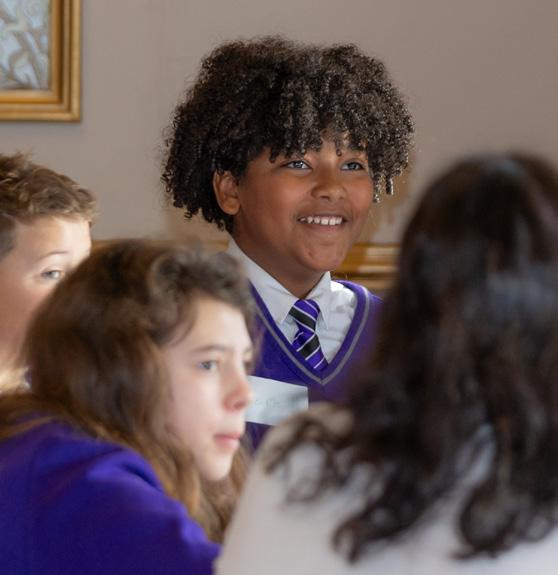

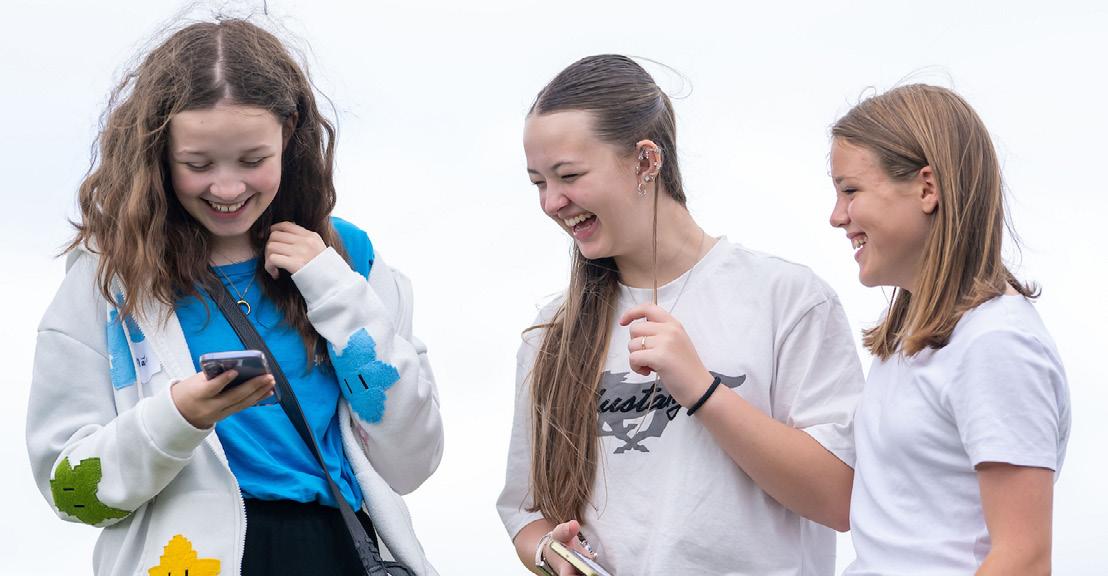
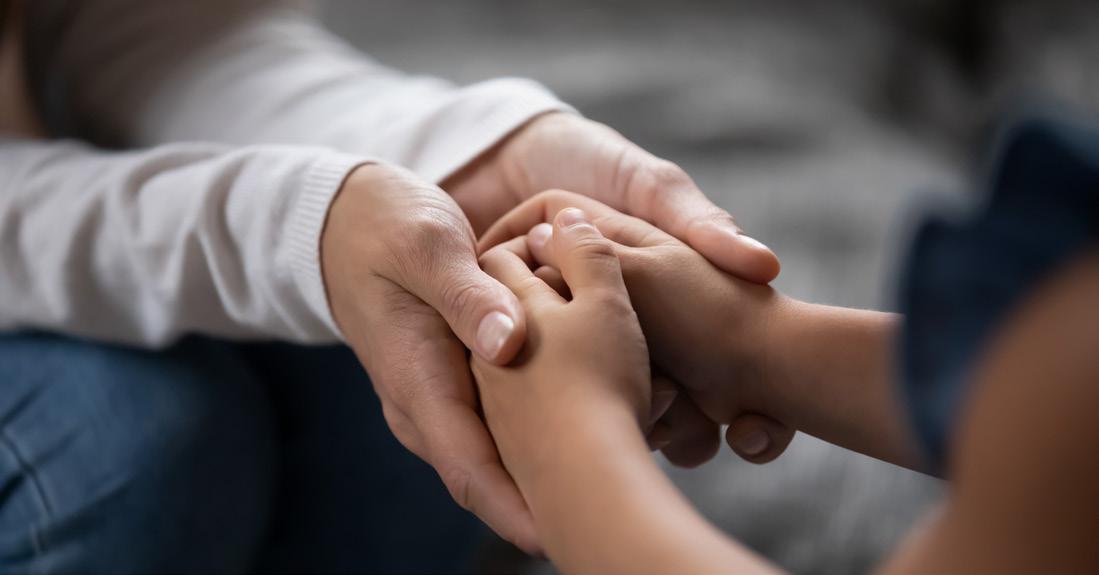


We value the diversity and uniqueness in our team members and wider stakeholders and believe we are stronger together.







We value the diversity and uniqueness in our team members and wider stakeholders and believe we are stronger together.
The diagram below includes details of our vision, mission, our priority areas and our internal, organisational drivers. It also details our four functions and how it all ties into our three-year strategy and annual work plans. You can read more about all of this on our website, here
‘A Wales where every child and young person understands their rights, knows the children’s commissioner is there to stand up for those rights, and is able to access support for those rights to be realised’.
We listen to and speak up for children and young people in Wales so that children’s rights are protected, and we support, challenge and influence public services in Wales to make a positive impact on their lives.
from the Children’s Commissioner for Wales,
Rocio
Cifuentes MBE
This is my third year in post and the second year of our strategy. I’m pleased to say that we’ve seen some significant successes across the team and secured some momentous changes to children’s lives during this year.
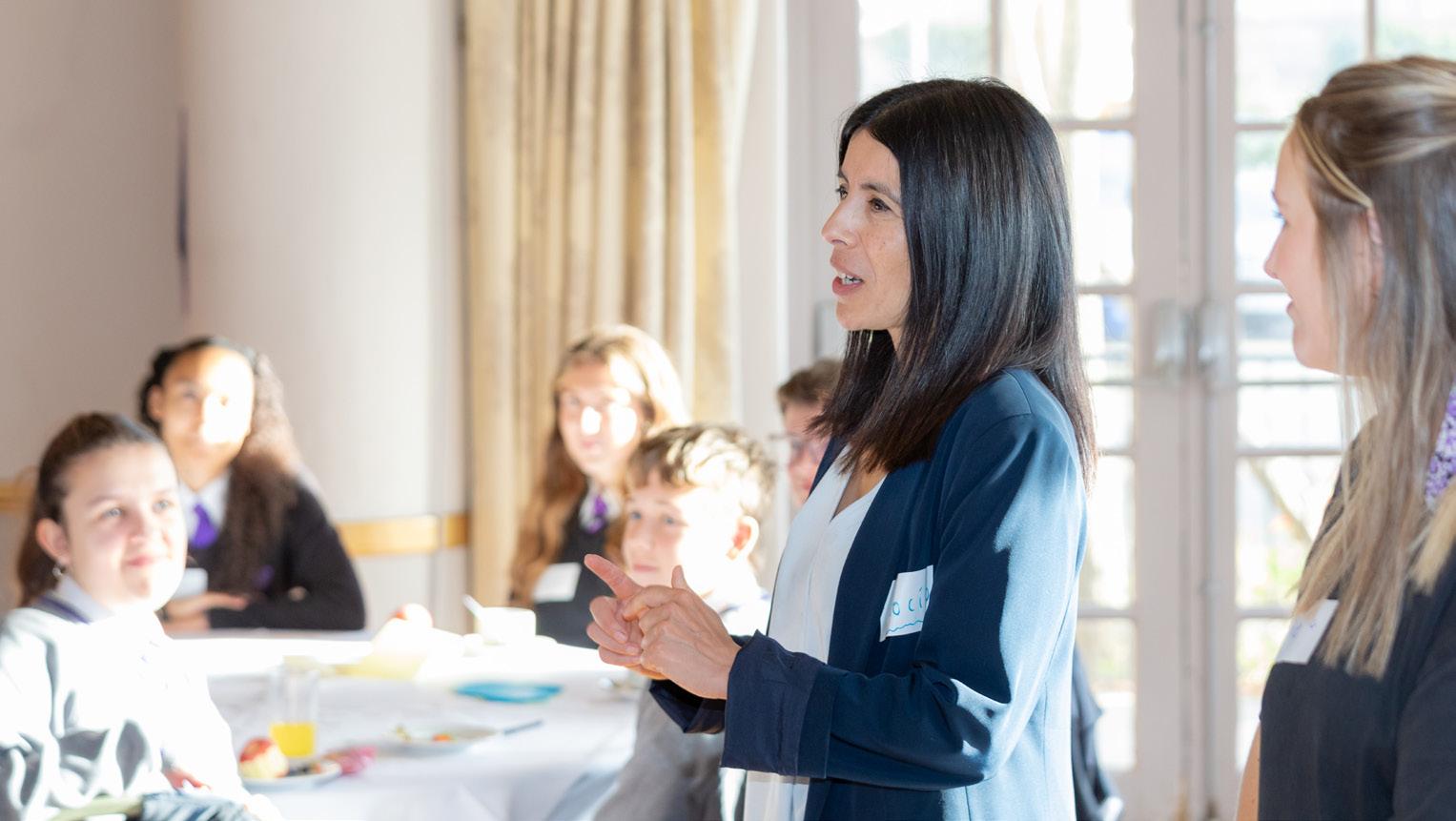
The highlights I’ve chosen this year may not all have secured media headlines, but because of the work of my dedicated staff team, some significant changes have happened that will improve children’s lives in Wales and their access to rights.
These include:
Secured a commitment from Welsh Government to review their school complaints guidance, which had entailed some stubborn children’s rights breaches, highlighted through our case work.
Saw the removal of outdated texts from the WJEC syllabus as a direct response to what we heard from young people in our work on racisms in schools.
Through our work as a core participant of the UK Covid 19 Inquiry, we ensured questions about children’s rights impact assessments and children’s rights were raised during its work looking at how the Welsh Government responded to the pandemic.
From correspondence we sent to Ministers to raise issues identified from our case work and school visits, we secured a review of building regulations for special schools.
Welsh Government has set a target for monitoring corporate parenting sign-ups, and involving young people in the scrutiny of the pledges made by organisations - we have influenced this through our evidence to the Bill, membership of the advisory group on Corporate Parenting, and engagement with officials and Ministers.
Our scrutiny work, using our legal powers, of a local authority and other public bodies over historic safeguarding failings has resulted in policy changes within the local authority, a review of practices in relation to information-sharing on child protection concerns for those in positions of trust, and consideration of an historic Single Unified Safeguarding Review (SUSR) examination.
The rest of this report provides an overview of progress we’ve made against our other priorities during the period 1 April 2024 – 31 March 2025 and includes highlights from across the team. It concludes with a series of recommendations for Welsh Government. These have been crafted intentionally as critical priorities for children as we head into an election year in Wales and is structured around the four indicators for the protection, respect and promotion of children’s rights, developed by the European Union Agency for Fundamental rights.

Rocio Cifuentes MBE
Children’s Commissioner for Wales
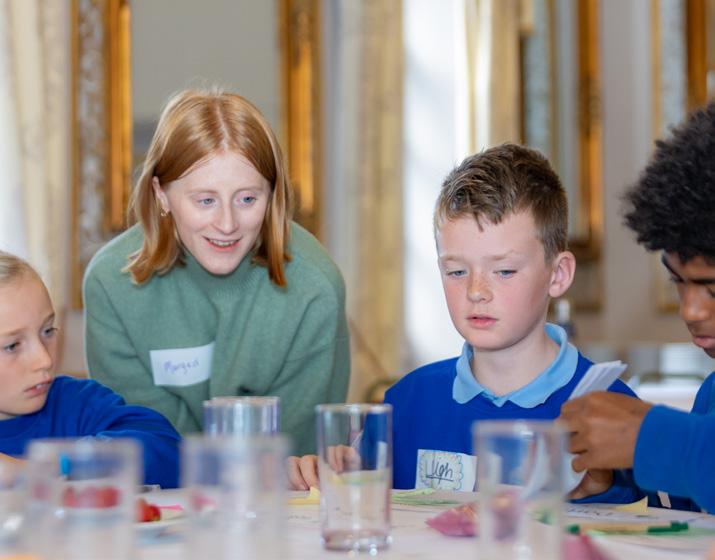
Our staff team of 23 work as one big team to deliver all our work. We have specialisms as well; here’s how it works day-to-day: Here for all children: our participation staff deliver work across Wales, listening to children, working with those who work with children, supporting children and adults to find out more and understand about children’s rights.
A truth teller:
our communications staff make sure that those in power hear children’s experiences and make changes as a result. We shine a light on issues affecting children, using every opportunity to share children’s experiences and views.
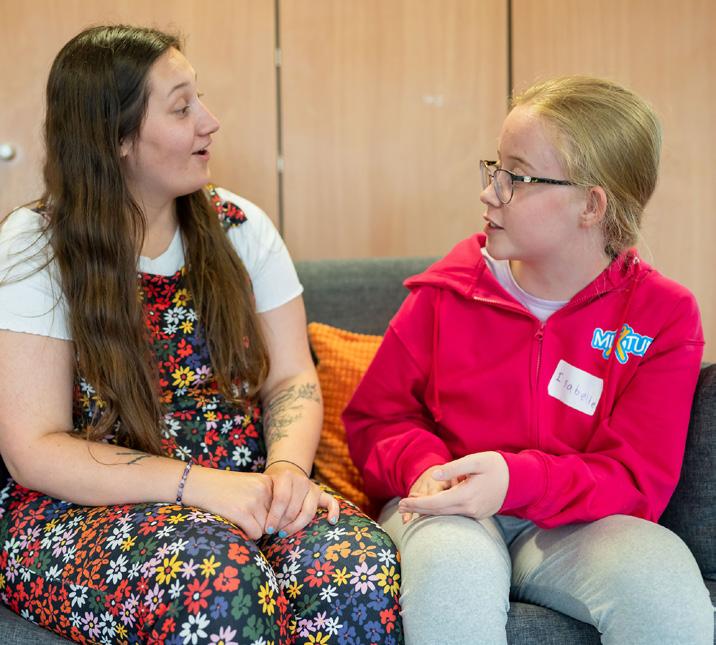
A challenger:
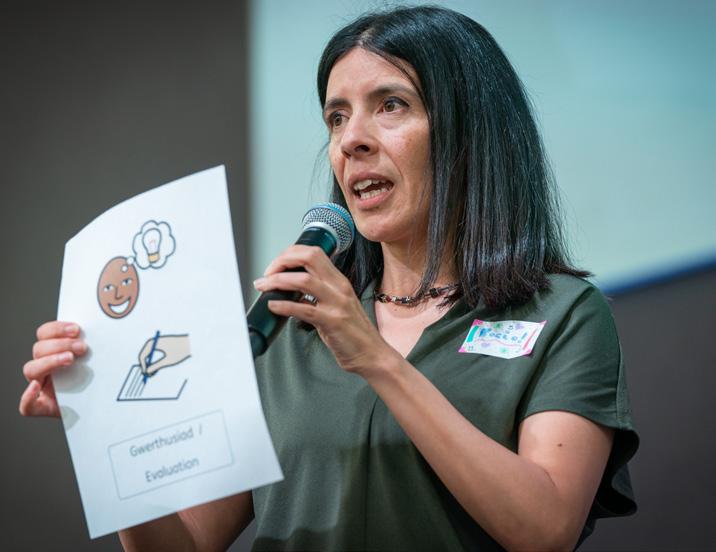
A rights realiser:
our investigations and advice officers run our independent service for children, their families and professionals who think children’s rights have been breached. We work to resolve issues and feed case work examples as evidence of wider changes we may decide are required to protect children’s rights and improve children’s rights in Wales.
our policy staff influence decision makers, including Welsh Government, to consider and uphold children’s rights in all its decision-making. When promises are made by public bodies, we’ll make sure we follow up on those to make sure promises to children and young people are kept.
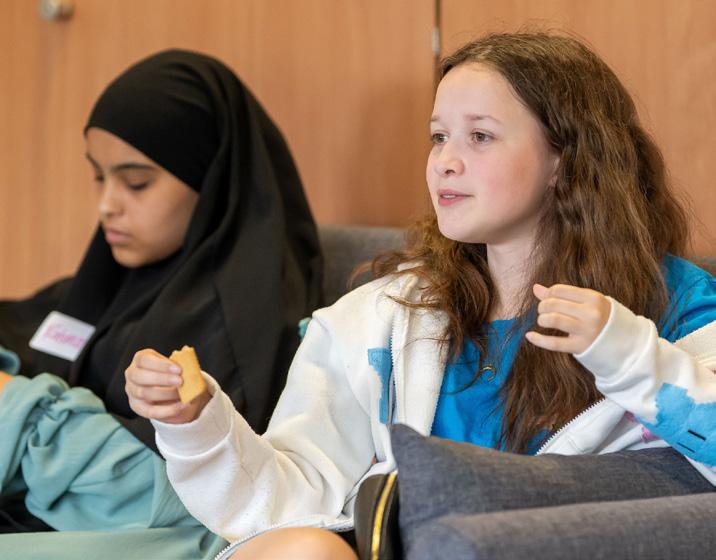
Staff within our engagement team are responsible for all our participation work with children and young people and our communications work. In practice, this means that our team of 3 participation officers deliver work across Wales, listening to children, working with those who work with children, supporting children and adults to find out more and understand about children’s rights. Two communications staff make sure that those in power hear children’s experiences, shining a light on issues affecting children, using every opportunity to share children’s experiences and views.

All our work is shaped to deliver these ambitions: We want more children empowered to access their rights, through increased awareness of their rights and of the Children’s Commissioner, and feel heard National policies are influenced and improved
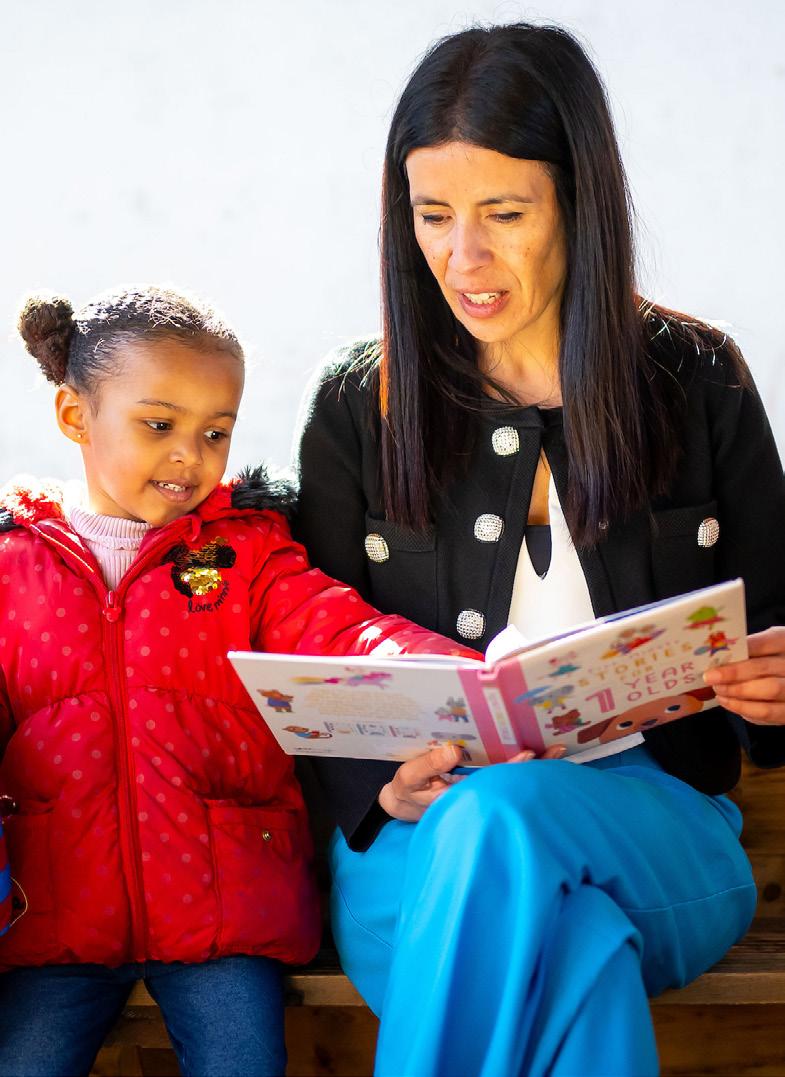
This is how we’ve delivered on these ambitions this year:
For us to be able to measure our impact, we commissioned Beaufort Research to measure the awareness of the Children’s Commissioner amongst children and young people, via a nationally representative survey. Results indicated that awareness has increased since we last undertook the survey work in 2017 (2017 result: 19% of respondents had heard about CCfW // 2024 result: 36% (as high as 61% amongst Welsh speakers)
Worked directly with over 9,000 children and young people, in every local authority in Wales (through in person engagement)
Enabled over 20,000 children and young people from every local authority in Wales to have their voices heard via Monthly Matters, our monthly survey we run to gather children and young people’s views on hot topics. This year, we’ve gathered views on issues including energy drinks, smartphones in
school, school toilets and play time, and those experiences have shaped some key policy consultations and secured media headlines on Wales Online and BBC News
Gathered the views of under 16s on the issue of housing and homelessness, to inform our spotlight report: How housing and homelessness affects children and young people in Wales’ –this is the first time anyone’s gathered the views of this age group on this issue in Wales
Teamed up with E-sgol to run awareness sessions on children’s rights, which attracted over 2,000 learners from across Wales
Introduced enhancements to our website, which now includes a dedicated section for children and young people, with information about the Commissioner, about children’s rights and about our advice service all available accessibly.
Our work with professionals who work with and for children and young people
To raise awareness of our work and our offer to professionals, we launched our quarterly impact paper. This not only provides an insight into our work and what we’ve delivered for children and young people, but also includes our thoughts and evidence on key children’s rights issues to help inform others’ influencing work. For example, our Winter Quarterly Impact report highlighted views of children and young people on climate action, human rights, and housing.
Delivered training sessions with various professionals including with health board practitioners during National Safeguarding Week and with over 70 professionals who joined us in our conference held in St Asaph in October 2024, from a range of sectors including health, youth justice, the police, local authorities and the third sector to learn how a children’s rights approach (our Right Way) can help them in their work.
Invested staff time in enhancing our social media offer, which has resulted in:
– Facebook content interactions up by 30.8% and visits up by 70%
– Instagram reach up by 280.4% and visits up by 70.4%
– New page launched on LinkedIn, creating over 26,000 impressions
We also took part in 37 conferences, hosted by organisations including Mind Cymru, Darpl and Play Wales.
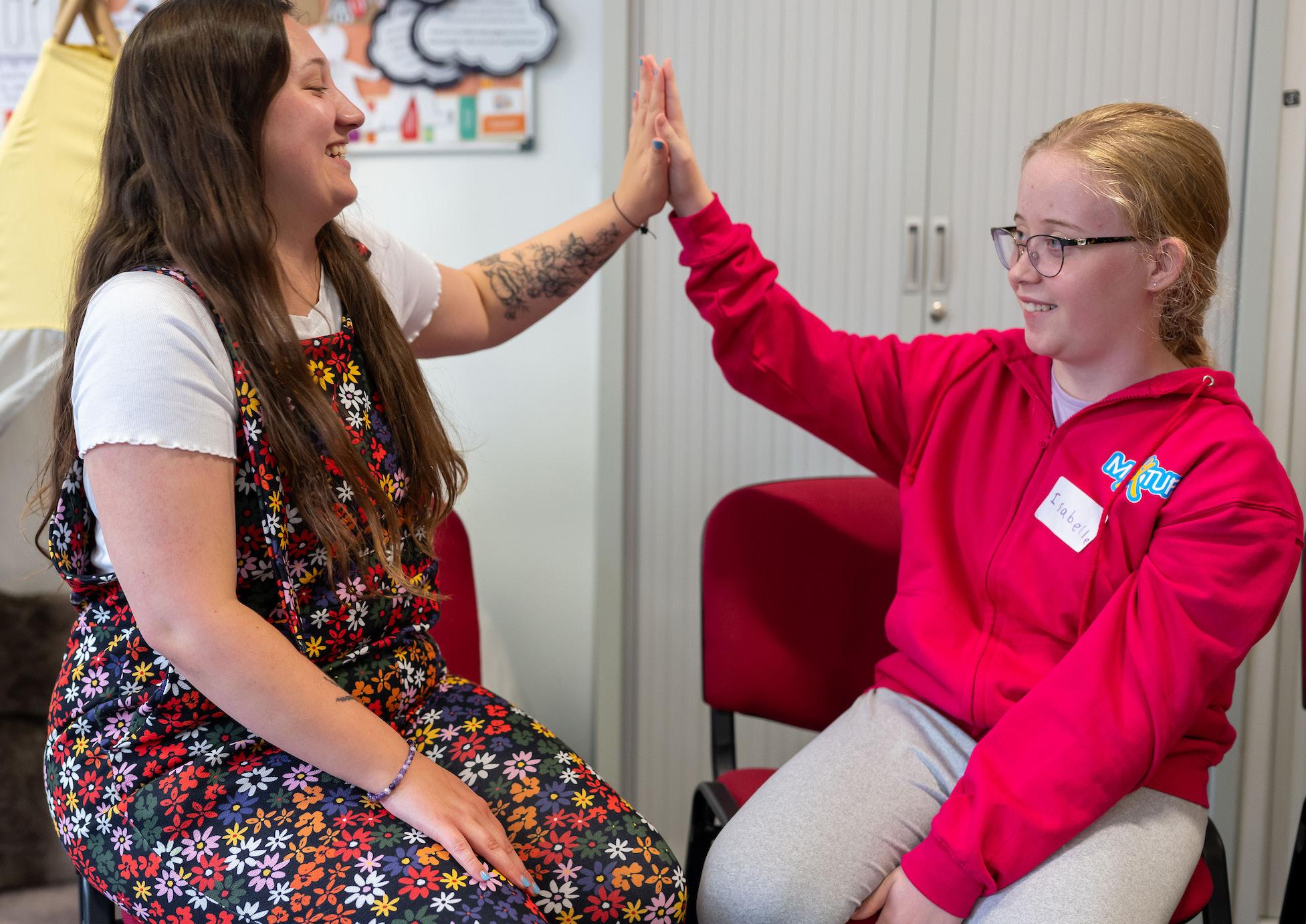
Child Poverty is the biggest and most important challenge facing the Welsh Government. In light of last year’s Welsh Government Child Poverty Strategy, and as the UK Government’s Child Poverty is being developed, we’ve called for Governments at both ends of the M4 to find a way to put more money into people’s pockets, to mitigate the impact of the cost-of-living crisis, and to protect children from the devastating impact poverty can have on their lives. And we’ve been clear that all public bodies have a role to play, too.
This year we published ‘A Children’s Rights Approach to tackling poverty ’, a practical framework to help focus policy and budgetary decision-making on addressing the needs of the most vulnerable children. We teamed up with Swansea University’s Observatory on Human Rights of Children to host a webinar all about the new framework.
We know from our own large-scale nationwide survey in autumn 2022, and the work of others, that mental health and wellbeing is one of the biggest issues children and young people are concerned about. This is also true of parents and carers; and professionals supporting babies, children, and young people.
In December 2024 and January 2025, we held 4 focus group sessions with young people; and 3 roundtable events with professionals working with and for babies, children, and young people, from across the statutory and third sector.
We were keen to discuss good practice examples, and positive experiences of what works, as well as the challenges and examples of poor experiences. You can read more about this work here
We’ve created and published policy position papers on key topics this year, including on mental health, additional learning needs, learner travel in Wales, and our thoughts on ‘A Wales for all Children’. These papers provide a valuable insight into the evidence we’ve gathered about various topics and an insight into what we’d like to see changed.
Our work to shine a light on issues affecting children and young people via traditional media also resulted in 438 separate pieces of coverage for the organisation this year, resulting in over 2bn opportunities to read or hear about our work.
Here’s a sample of the feedback we received from our training sessions hosted this year:
Took a lot from the day to take forward in my role.”
Excellent training with great presenters.”
Very interesting session. Good to know about the monthly surveys for children and young people and that individual families can make contact if they need advice/support with an issue.”
Here’s a sample of what changes professionals have committed to their own practice as a result of our Right Way events:
To review how much of an input children are having on our service and development”
Share knowledge and resources with colleagues and implement in practice”
Adapt my thinking”

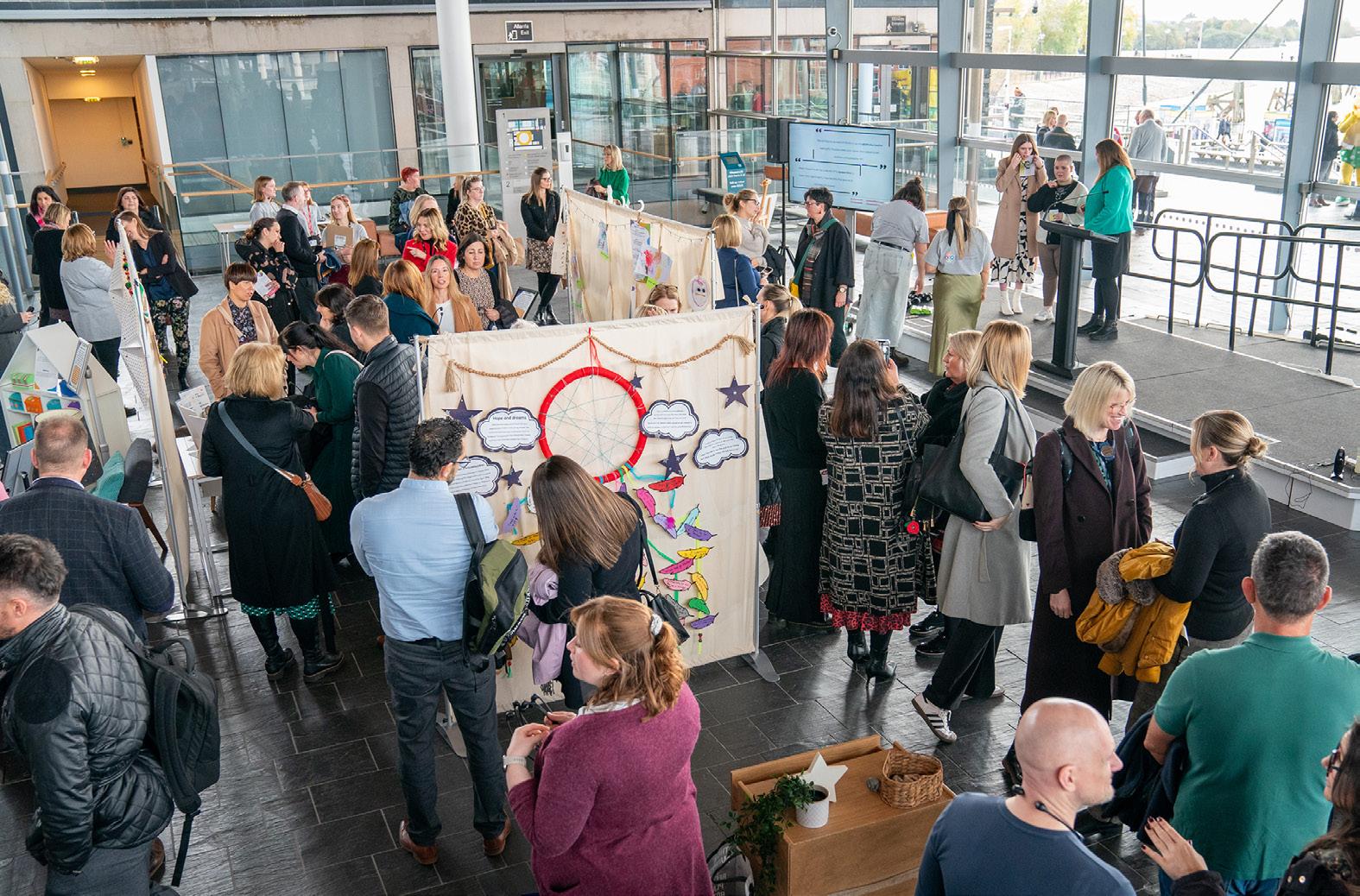
Lwc|Luck: the experiences of care experienced young people; the story so far
In 2024, we signed up to a pan-European piece of work with the European Network of Ombudsperson for Children (ENOC) which focused on Alternative Care. We worked with Hope Girls’ Rights Group from Neath Port Talbot to participate in the European Network of Young Advisors (ENYA) who bring young people’s voices from across Europe to the ENOC work. Members of our team supported two members of Hope to take part in a conference with other young people from across Europe in Slovakia. From this, ENOC has published a joint statement on the care and support needs for children in alternative care. But the work we’d done with the girls had generated so much thought, discussion, and evocative content, we felt that there was more we could do in Wales with our recommendations and so, the Lwc exhibition was created.
On 12 November 2024, we hosted an interactive and immersive exhibition in the Senedd with Hope’s Girls Rights Group. Over 100 attendees were invited to enter a foster carer’s ‘home’, accompanied by the voices of care experienced young people that we’d worked with, describing their experiences of placement moves and unfamiliar surroundings.
The event centred around five recommendations created by the Hope Group, which include therapeutic and mental health training for foster carers, and participation of children and young people in care meetings. The event also featured artwork by their peers from across Wales. You can read more about the Lwc exhibition and the work here.
As a direct result of the work, we’ve already seen some changes, including:
• Welsh Government reviewing Part 6 Code of Practice to ensure greater involvement of children in decisions about their care. We are continuing to actively participate in this process
• Introduction of foster carer profiles/ welcome letters, for children to learn a bit about their new carers when they arrive
• Mental health first aid – AFKA Cymru developed 3 workshops in response to our recommendations:
– Supporting carers to work with teens
– Supporting carers with teens who selfharm
– Supporting teens through puberty
Our Investigations and Advice Officers are responsible for the delivery of our free and independent Children’s Rights Advice and Assistance Service. We have three dedicated Investigations and Advice Officers who offer a confidential and accessible service for children, their families and professionals to raise concerns, seek help, and receive support in navigating their rights and entitlements.
The insights gathered through our casework help inform our influencing work. This enables the office to take forward emerging issues with Welsh Government and other public bodies, ensuring that individual cases contribute to wider systemic change. Our casework also informs the Commissioner’s responses to consultations, helping to make sure that the voices and experiences of children, young people and families directly shape national policy and practice.
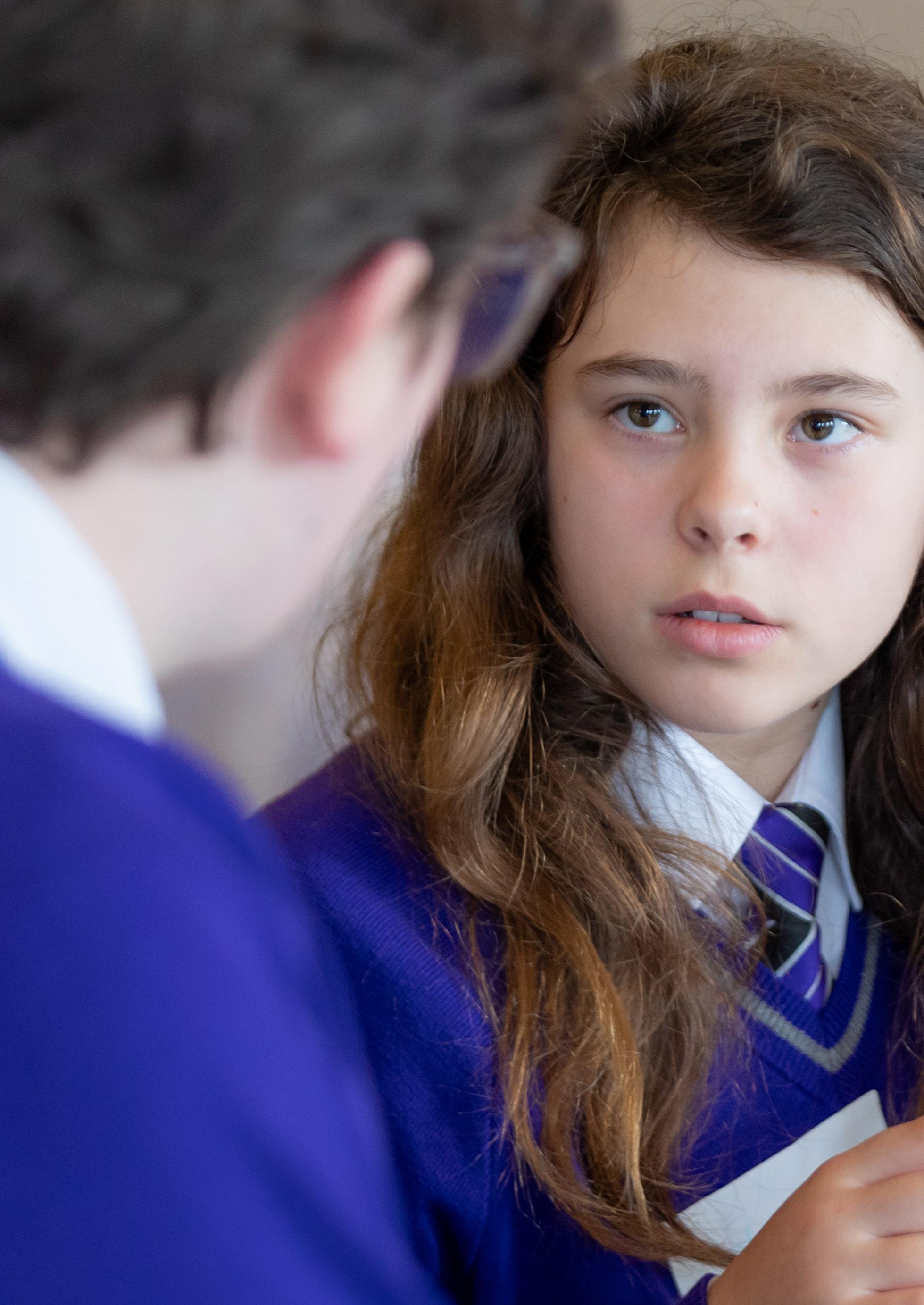
All our work is shaped to deliver these ambitions:
More Children’s rights are protected and realised
Local and National Practice is challenged and improved
This is how we’ve delivered on these ambitions this year:
The total number of cases handled during this period was 659. This represents a slight increase from the 623 cases managed in 2023–2024.
This caseload reflects all cases handled by the Advice and Assistance Service during the year. In many cases, we were able to resolve the issues on the same day by providing appropriate advice, information, or signposting to the right service. In these situations, parents, carers and young people were empowered to take forward the next steps confidently themselves. These include both one-off contacts and more complex cases where we gave detailed advice and support.
During the reporting period, the Advice and Assistance Service responded to a wide range of
Education-related enquiries continued to represent the largest proportion of the caseload, making up 35% of all issues raised. These covered concerns such as school complaints, access to appropriate support, bullying, placement decisions, and challenges around exclusions and transport.
Cases relating to Social Services were the next most frequent category, accounting for 24% of total issues. These included complaints about service quality, provision and funding of support, and concerns about placement stability. Many cases involved significant advocacy for families navigating statutory processes.
A further 15% of issues related specifically to Additional Learning Needs (ALN). Enquiries focused on individual development plans (IDPs), assessments, placement disputes, provision concerns, and access to appropriate support. A number of these cases involved multiple issues, highlighting the complexity of multi-agency responsibilities.
Throughout the year, several key patterns and insights were noted:
Persistent demand for education-related support: While education remained the highest category of contact, the nature of cases became more complex. Families regularly sought advice on school-based complaints, exclusions, and ALN provision. Concerns about the consistency of processes and delays in support are regularly reported to us.
ALN complexities remain a significant theme: Many families described barriers in navigating IDP processes, inconsistencies in the application of statutory guidance, and disputes about appropriate placements and provision.
Other notable categories included:
Health issues (5%) such as CAMHS access, Neurodevelopmental pathway delays, and complaints regarding service provision; Community issues (5%) involving play, leisure, and broader wellbeing; Housing (3%), which included enquiries about access to temporary accommodation, accessible housing for disabled children, and the suitability of housing for careexperienced young people; Out of remit cases (11%) where enquiries related to areas such as private law proceedings, welfare benefits, and adult legal issues, requiring careful signposting.
The broadness of the enquiries shows the diversity of challenges children and families experience and the value of a service that takes a holistic, rights-based approach, while in some cases we are not allowed to intervene, our caseworkers always endeavor to provide advice.
A high volume of concerns were social services responses, particularly placement breakdowns, delays in assessments, and access to advocacy for children in care.
Out of remit enquiries: Despite clear communications about the scope of the service, a notable number of contacts still fell outside our remit. These often related to court proceedings, legal aid, and family disputes. The team worked hard to offer respectful redirection and signposting.
Direct contact from children and young people remains limited: Although we received some direct contact, most enquiries continued to come from parents, carers, and professionals. When children and young people contacted us, we ensured their voices were heard through a responsive approach.
The Advice and Assistance Service remained accessible through a range of contact methods over the course of the year. The most common method of contact was by telephone, accounting for over half of all enquiries (359 cases). Email remained the second most utilised route (269 cases), with limited contact received in person or by letter.
In terms of referral sources, parents remained the most frequent contact group, followed by extended family members, members of the public, and foster carers. Although contact directly from children and young people remains relatively low, the service maintained a childcentred approach when engaging directly with them.
Most people who contacted the service were signposted to us via word of mouth, indicating a strong reputation for trust and informal advocacy in communities. However, there were also a notable number of referrals from professional sources, including social workers, teachers, advocacy providers, and elected officials, highlighting the service’s professional independence and balanced approach.
This data demonstrates the value of continued outreach and public awareness activities, as well as the importance of being responsive across multiple communication channels to meet diverse access needs.
The profile of these young people varied in age, education setting, legal and living status:
Education context – of those who disclosed the information to us
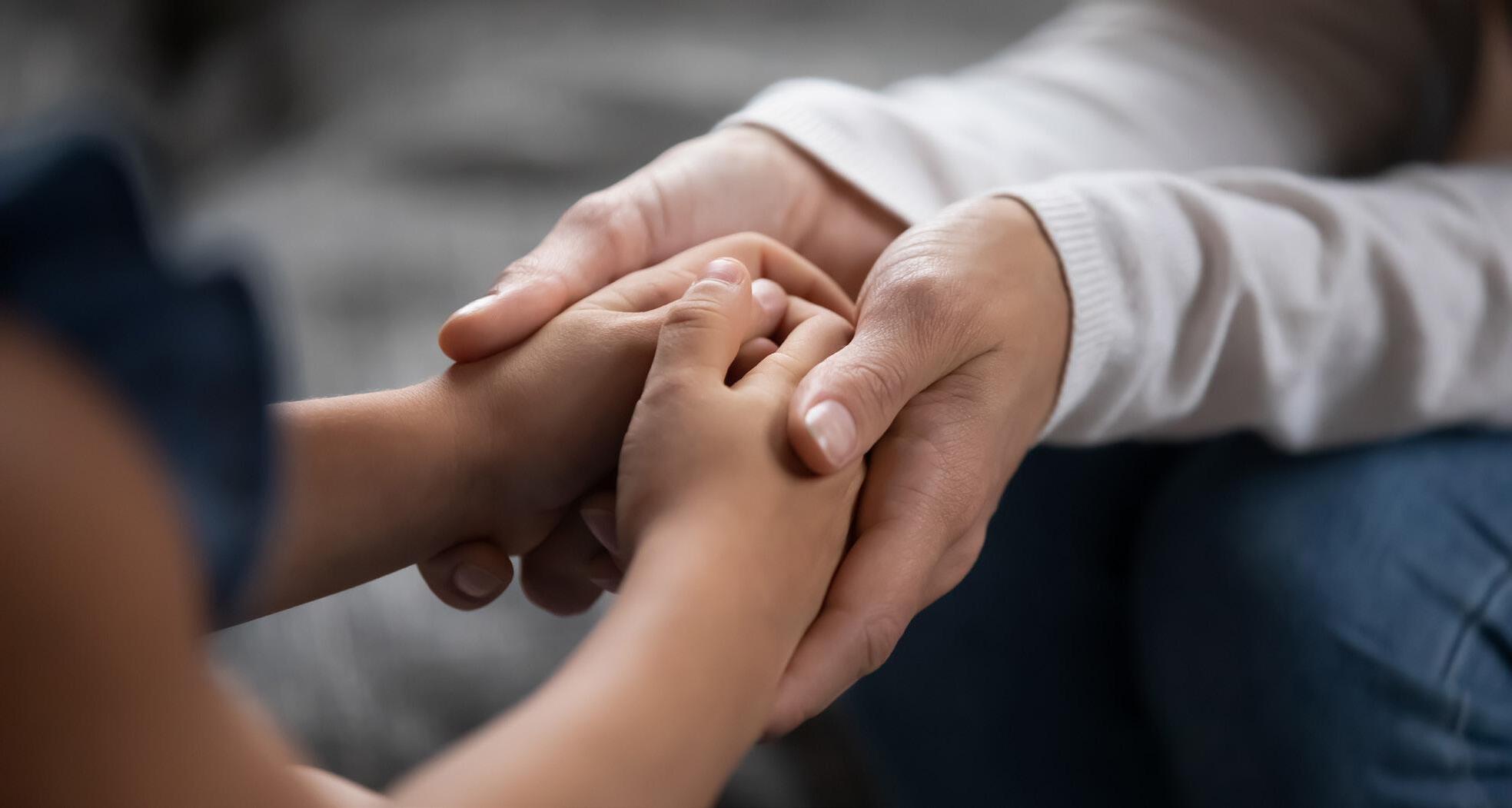
The breadth of casework undertaken this year demonstrates the Advice and Assistance Team’s core function in enabling children, young people, and families to understand their rights.
In many cases, our timely interventions helped secure access to education, advocate for appropriate placements, challenge discriminatory practices, and ensure that the voices of children and young people were not only heard but acted upon. For example, our involvement led to increased school support following exclusions, ensured Individual Development Plans (IDPs) were properly implemented, and enabled access to advocacy or legal advice where it was otherwise unavailable. In complex multi-agency scenarios, we provided clarity and signposting, holding local authorities accountable and challenging poor practice when necessary.
Between 1 April 2024 and 31 March 2025, the Advice and Assistance Service managed 659 cases, of the cases concluded:
• Over 60% cases involved the provision of advice and assistance, empowering families through signposting, information-sharing, and supportive discussion.
• 30% required active intervention from the team and were successfully resolved through engagement with public bodies or escalation of concerns.
The remaining 80 cases were carried forward into the next reporting year.
These interventions often resulted in immediate practical improvements – such as reinstating school transport, facilitating managed moves, or retaining essential support through social services. Beyond individual outcomes, our engagement continues to inform wider policy and systems change.
Many families feel less isolated and more empowered following contact with our team. The impact of our work is visible not only in the outcomes achieved but, in the reassurance, and dignity afforded to those navigating often challenging and complex systems.
A
A parent contacted our Advice and Assistance service with serious concerns about ongoing bullying experienced by their child in a secondary school. The child had been targeted by a group of peers over a prolonged period, including verbal abuse and social exclusion. Despite the parent raising these issues with the school, they felt that the responses had been insufficient and inconsistent, leaving their child distressed and increasingly reluctant to attend.
The parent was also concerned that the school’s actions did not appear to align with the anti-bullying policy or the local authority’s wider safeguarding duties. The situation had escalated to the point where the parent felt there was no clear plan in place to keep their child safe or to address the bullying behaviour.
After reviewing the available information, we contacted the local authority and escalated the case to the Director of Education to clarify what steps were being taken to ensure the child’s welfare. Our correspondence
A school contacted the Advice and Assistance team to raise serious and ongoing safeguarding concerns about a child who was already subject to child protection processes. Staff felt that despite their repeated referrals and professional input, the concerns were not being prioritised appropriately, and they remained deeply worried about the child’s safety and wellbeing.
The team listened to the concerns and received a written summary from the school, which was then shared directly with the Service Director for Children’s Services. In
emphasised the importance of timely safeguarding action, effective communication with families, and the child’s right to an education and the right to be safe as defined within the UNCRC.
Following this, the Director confirmed that additional measures would be put in place, including a revised support plan, closer staff monitoring during vulnerable times of day, and a commitment to improved communication with the family. The parent later confirmed that the school had begun to take a more structured and responsive approach, and that their child’s emotional wellbeing had improved.
This case highlights how appropriate escalation, rights-based advocacy, and clear expectations around safeguarding duties can contribute to more effective outcomes for children and families. It also illustrates the importance of working constructively with senior local authority officers where families feel their concerns have not been heard.
response, a Tier 1 professionals meeting was arranged, in line with local safeguarding procedures for resolving differences of professional opinion.
This case illustrates the role of the team in supporting professionals who are trying to ensure that safeguarding concerns are fully recognised and acted upon. It also highlights how clear, direct escalation can play a vital role in making sure that children’s rights and safety remain central when professionals disagree.
A parent contacted the Advice and Assistance team with serious concerns about one of their children, whose behaviour was putting younger siblings at risk. At the time of contact, a Section 47 investigation was underway and the younger children had temporarily moved to stay with other family members for their safety. The parent expressed that they were struggling to cope and were seeking urgent support, including the possibility of alternative living arrangements for the older child.
The team listened to the parent’s concerns and, with consent, contacted the local authority to ensure these were fully understood. We also raised additional concerns about the child’s lack of access to education and emotional wellbeing support.
Following our involvement, the local authority confirmed that a new assessment had been completed, and a child protection meeting was planned. A revised package of support—focused on education, behaviour, and wellbeing—was agreed, including a blend of specialist tuition and vocational opportunities. A safety plan was also developed to help the family manage risks in the home.
This case demonstrates how the team can support families to raise safeguarding concerns in a constructive way, helping to ensure that local services are responsive, risk is addressed, and tailored support plans are put in place to safeguard all children involved.
Following our involvement, the headteacher responded promptly, providing the following information:
The school had been facing staffing challenges due to the resignation of two cleaners, which had temporarily impacted the availability of hygiene supplies.
The issue with hygiene supplies had been rectified, and the new cleaning team was now in place.
The school’s policy ensured that toilets were accessible at all times. Before the start of the school day, during break and lunch, and throughout lessons, a member of staff was stationed near the toilets to monitor access and ensure pupils could use the facilities as needed.
The Advice team was contacted by a group of pupils raising concerns about access to school toilets and the lack of hygiene supplies such as toilet paper, hand soap, and hand towels. They reported that toilets were locked, and access was limited, causing inconvenience and discomfort.
Given the nature of the concerns, our team decided to take action to ensure that children’s rights to hygiene, dignity, and proper facilities were upheld. We contacted the acting headteacher to raise these issues, ensuring that the pupils’ concerns were communicated clearly and without identifying specific individuals.
To further support accessibility, the headteacher committed to checking with the head of campus to ensure this policy continued to be effective and that any further issues were addressed.
As a result of our intervention:
Pupils were reassured that they would have access to toilets and hygiene supplies as needed.
The school implemented measures to ensure better communication about its toilet access policy to pupils.
This case demonstrated our office’s commitment to advocating for children’s rights and well-being, ensuring that concerns were addressed swiftly and collaboratively with the school.
Our young people’s advisory panel exists to provide independent advice, scrutiny and challenge to the team. Members act as critical friends and a sounding board for the team.
This year, we’ve piloted a new way of working with our young people’s panel, which has involved working more closely with our Community Advisors (previously known as Community Ambassador). We have offered an opportunity for our community advisors to take part in our Young People’s Advisory Panel discussions, to help ensure our panel is as inclusive as possible and that we’re hearing the experiences and views of young people who may be under-represented in our national advisory panels.
At our last meeting with them, we asked the following questions:
Has your understanding of Rocio’s role as the Children’s Commissioner and work of her team improved?
86%
said yes
Has your understanding of children’s rights improved?
said yes
Did the session help you have your voice heard?
What do you enjoy the most about being a part of the Commissioner’s advisory panel?
Responses included:
People listen
Learning more from other groups and how their school rights work
Learning new things
Meeting new friends
Feeling like I’m heard and not made felt like a side thought 86% 68%
said yes
Just being here
I enjoy that you learn from these kind of meetings. I can also express my opinions and my voice can be heard.
To begin with, we have highlighted some key areas of work that we have undertaken related to our strategic priority areas, demonstrating the breadth of work undertaken and the different ways in which we work to secure positive outcomes for children in Wales.
• As a continued priority area for the Commissioner during 2024/25, we published a policy position paper on mental health and wellbeing this yearwww.childcomwales.org.uk/our-work/policy-positions/ mental-health/
The paper includes insights from children and professionals about existing challenges and what changes need to happen, examples of good practice, and recommendations. Insights were also gathered from a series of roundtables held with professionals and focus groups with young people to discuss the topic of Mental Health and Wellbeing, with took place in December 2024 and January 2025.
• In June 2024, we responded to the Welsh Government’s consultation on the new all age mental health and wellbeing strategy. Our key call in that response was that there needs to be a delivery plan to focus specifically on the needs of babies, children and young people.
• Also in June 2024, we surveyed children and young people about their wellbeing online, where we heard from over 1,200 children and young people from across Wales. The survey shows that only 39% of children and young people have reported something that made them feel unsafe, worried, or upset to an app/website/game, and that only 32% of children and young people felt that the app/website/game took your concern seriously.
In October 2024, the Welsh Government announced a review of the Additional Learning Needs legislative framework. As part of this work, we have attended meetings of the Welsh Government’s ALN Reform National Steering Group as observers. These discussions focused on crucial aspects of ALN policy, including the need to position ALN as a national education priority, and to promote multi-agency collaboration.
Drawn from our casework evidence, we produced a video illustrating the experiences of parents with children with additional learning needs. The conversations covered themes that we know are present across the country for parents trying to get an education that is right for their child, including a system that is hard to navigate, slow progress, and the feeling that everything is a battle. We have shared this evidence with the Welsh Government to inform their review. We have also submitted a response to the Welsh Language Education (Wales) Bill, urging the Welsh Government to establish a clear timetable for the development of national interventions. In our response, we also called for the publication of detailed plans across key areas such as workforce planning, resources, and professional learning.
• The Commissioner has given regular statements and media interviews on child poverty this year, including her calls on the need for a Welsh Child Payment and the priority to remove the 2-child benefit rules and benefit cap levels, and on the £1 bus fares for 16-21 year olds.
• We’ve had the following articles and commentary pieces published -
www.bbc.co.uk/news/uk-wales-politics-68056286
www.walesonline.co.uk/news/politics/child-cameschool-single-carrot-28280821
nation.cymru/opinion/how-well-is-wales-protectingchildrens-rights/
www.bbc.co.uk/news/uk-wales-67238317
www.walesonline.co.uk/news/education/wales-failingchildren-expecting-one-30447614
www.walesonline.co.uk/news/education/one-majorproblem-free-school-29051432
• We have continued to sit as active observers of the Welsh Government’s External Reference Group for their child poverty strategy, advising on the need for monitoring and reporting on the effectiveness of the strategy to directly relate to and reflect the actions taken by the Welsh Government. We have argued that it is critical to understand what is making the biggest difference in addressing child poverty, so that public money can be spent on the most effective methods and initiatives that work to address poverty can be scaled up to reach all of those in need.
• We have joined the working group on Streamlining Welsh Benefits, to take forward the calls from our 2019 ‘A Charter for Change’ report on tackling child poverty. Specifically, this is about passporting or auto enrolment
of eligible people to all relevant benefits once a local authority holds evidence of their financial circumstances. As part of many measures to tackle child poverty, putting money in families’ pockets should be a key priority, and it is essential that every effort is made to enable families to receive all their entitlements.
• We have undertaken multiple meetings with officials, and submitted a summary of written evidence of children’s voices and experiences from Wales to the UK Ministerial Taskforce on child poverty. Work on this continued throughout 2025, towards the delayed publication of the UK Government Strategy. Some of the evidence included in our evidence shows that 45% of children aged 7-11 whom we surveyed told us they worried about having enough to eat, and a significant number of children and adults worried about other costs related to basic needs. We also discuss our engagement work with children to inform Welsh Government’s Child Poverty Strategy, as well as the impact of the devolution settlement on tackling child poverty in Wales.
• Working in conjunction with the Wales Observatory on the Human Rights of Children, and the Children’s Legal Centre, we developed and published The Right Way: A children’s rights approach to tackling poverty which sits alongside existing publications from our partners. Our supplement provides guidance on a children’s rights approach (CRA) to child poverty – it outlines a practical framework that supports the fulfilment of children’s rights. It offers for public bodies a holistic way of working that supports principled and practical implementation of all the rights of children, including rights that impact on child poverty.
• The Commissioner spoke at the Welsh Government’s child poverty conference in October 2024, pushing for greater action to secure automatic access to entitlements to Welsh benefits in particular, and increased focus on monitoring the impact of actions taken to address poverty in Wales.
• Equalities have continued to be a priority area for the Commissioner in 2024/25, with a particular focus on understanding the experiences of children with disabilities.
• We commissioned a report to further understand the experiences of Disabled children and young people living in Wales, “What is it like to be a disabled child in Wales in 2024? What do we know, and what do we need to know?” Some of the findings featured in the report include that children and young people from 7-18 years of age with disabilities are more worried than children and young people without disabilities in a number of categories, and that children with disabilities and young people who identify as disabled are more likely to experience bullying than children and young people without disabilities.
• We made representation to Welsh Government to support their efforts in updating a toolkit and template to support local authorities with their duty to publish their Play Sufficiency Assessments. The refreshed play sufficiency statutory guidance ‘Wales – a Play Friendly Country’ includes an enhanced chapter about consultation, participation and engagement, including reference to our Right Way framework and guides.
• In March 2025, we ran a conference on children’s rights in St Asaph, north Wales where we explored the specific duties on public bodies to involve and work with children and young people. These include the duty on local authorities in the Children and Families (Wales) Measure 2010 to promote and facilitate participation by children in decisions which might affect them, and Chapter 5 of the Additional Learning Needs Code for Wales 2021 which requires local authorities and NHS bodies to have due regard to the UN Convention on the Rights of the
Child and the UN Convention on the Rights of Persons with Disabilities. The event showcased how a children’s rights approach could provide valuable framework for delivering these duties and for ensuring the effective participation of all children and young people.
• For this event, we worked in partnership with Wrexham University, and a group of Disabled young people from St Christopher’s School, Wrexham to take part in Public Narrative training. Learners from the school received in-person, public narrative coaching sessions to support them to deliver a TEDx-style talk around the topic of ‘voice’. The approach to working with young people and the message that they shared has featured in news articles. For example: CIW Magazine Summer 2025 English by childreninwales - Issuu
• We know that disabled children and young people face some of the biggest barriers to education. For disabled children, our work this year, in regards to education, has included:
– pressing on the National Attendance Taskforce to consider the rights and needs of disabled children and young people as it attempts to resolve the persistent issue of absenteeism;
– holding Welsh Government to account on the delivery of the recommendations resulting from the Senedd’s Children’s Committee Inquiry into whether disabled children and young people have equal access to education.
– responding to an issue that arose from our casework around the lack of legal provisions governing the size and layout of special schools, we called on Welsh Government to move ahead with urgency to review and strengthen guidance that would help increase access to schools for disabled learners. Welsh Government have indicated that they will take this forward, and we’ll work with officials to ensure the review of the guidance ‘Planning to Increase Access to Schools for Disabled Pupils’ addresses the needs of children and young people.
– Writing to Qualifications Wales to detail our concerns on the decision to suspend the introduction of a GCSE in British Sign Language, to understand what the practical challenges were and how this decision will be kept under review. We’ve also provided evidence in support of the BSL Bill in the Senedd.
In addition to
the
work done during the previous financial year, we also use this annual report to raise live issues, based on our work with children and young people. We have also suggested a number of recommendations to address these issues.
A review of trends in our casework identified 83 cases related to school complaints in one academic year, with issues found in relation to the processes and outcomes in 25% of those cases.
Issues were varied, from access to toilets to bullying, and some families had contacted CCfW because our details are included within the school’s complaints process and thought they should come to us as a next step. Our initial aim for the project was to help families navigate the processes, but when we worked through the Welsh Government guidance we found areas of confusion and contradictions. One particularly concerning aspect was how learners’ complaints should be dealt with, as the model policy says learner complaints are to be treated the same as complaints from adults/care givers, but then introduces a different process for learners to follow. Adults go straight in at Stage A to raise concerns with any teacher but learners are directed to their form tutor or have to go to the school council first. This feels like it introduces an additional hurdle or barrier to learners having their complaints heard and acted upon; a theme which was reflected in our case work.
We formulated a survey which we sent to all 22 Local Authority (LA) Directors of Education. The survey ran in the Autumn of 2024, and we received responses from 20/22 LAs.
We asked 10 questions including about monitoring arrangements of complaints processes, the LA’s ability to consider a complaint beyond stage C, how families can access the LA’s review of a school complaint, how many complaint reviews they’ve undertaken and how this is recorded / monitored and what support is provided to governing bodies in relation to dealing with complaints.
In summary, the responses revealed that there is:
• No consistent approach to monitoring schools in relation to their complaints policies; LAs only check that schools have a policy in place but don’t look at the details of this.
• The majority of responses stated that there is no scope for any further action beyond stage C, and consideration of maladministration of the process is not deemed an additional stage to the complaints process.
• No LA outlined a specific process / criteria for it to establish whether a complaint has been properly considered.
• There was a low number of complaints that had been considered by LAs in the last 3 years, with no consistent practice in monitoring these or records of learning from these being shared.
• No consistent practice across LAs regarding how governors can access support or training. This is a wider issue that has arisen through our policy and casework;
Currently, the guidance contains conflicting information on the roles of LAs, WG, CCfW, Public Services Ombudsman for Wales and others, which needs to be resolved, particularly in light of our survey work. We presented the findings to the Cabinet Secretary and her officials and were pleased with the response in February 2025 that officials have been tasked to review the complaints guidance as part of a wider review of a suite of related policies.
1. WG must progress their work to review and revise the model complaints policy, working with CCfW to address the deficiencies identified through our work.
2. WG must look again at recruitment, training and support for school governing bodies to ensure they are fully equipped to deal with complaints and any related governance issues such as managing any potential conflicts of interest. This should form part of a wider review of how school governing bodies operate.
Inclusive education ensures that all learners are supported to fully participate in all aspects of school life. However, for learners with Additional Learning Needs (ALN) to have their right to education fulfilled, more resourcing is required.
ALN cases continue to be the highest proportion of our education casework, year on year. Whilst this is a complex area, it is notable that this continues to be the case, in the context of new legislation having been introduced with an aim to improve the identification, assessment, planning, and delivery of support for children based on their needs.
It appears clear that the legislation has not succeeded in reducing the bureaucracy or hurdles that families have to clear in order to get the help their child needs and to achieve their potential.
In practice a more effective, targeted approach to allocating resources, based on children’s needs, is likely to be needed to specifically address these concerns, and any others identified by the Welsh Government’s own review.
Specialist staff members, training for all staff on ALN, accessible physical environments and facilities and access to assistive technology are examples of where increased funding could ensure that mainstream schools accomplish genuine inclusivity.
1. Welsh Government must recognise and address the issue of resourcing to realise their vision of inclusive education for all. This must include significant funding for school buildings, as well as addressing concerns about Teaching Assistant recruitment, retention and terms and conditions.
2. Welsh Government must closely address and implement the upcoming findings from the thematic review work being undertaken by Audit Wales this year.
As noted earlier in this report, child poverty has been a constant focus for the office this year due to its prevalence, pervasive, and disproportionate impact on children in Wales.
Welsh Government’s published data indicates that the percentage of people living in relative income poverty has been “relatively stable” in Wales for over 19 years. However, the word ‘stable’ here feels overly euphemistic when in fact it is stubbornly holding firm and not a metric that we want to see remaining stable.
Between financial year ending (FYE) 2022 and FYE 2024, 22% of all people in Wales were living in relative income poverty. But for children, that figure rises to 31% for the same period.
A child in Wales also had a 16% likelihood of being in persistent poverty between 2019 and 2023 (after housing costs were paid).
Emerging data appears to show a positive impact from the introduction of, and increase to, the Scottish Child Payment. Reports from expert organisations such as the Bevan Foundation and the Joseph Rowntree Foundation also highlight the positive aspects of a direct payment to families in deep poverty to directly mitigate the impact.
Welsh Government have repeatedly referred to the lack of levers that they hold to address certain aspects of child poverty, noting particularly the welfare system. Yet Wales administers some benefits, notably Council Tax reduction scheme, Free School meals and the School Essentials Grant.
The introduction of universal free school meals in primary schools is very welcome for a number of children’s rights, but this serves to highlight the inequity for children in secondary schools, particularly for those whose families are just above the FSM entitlement threshold, and are still in child poverty.
1. Welsh Government needs to explore all possible mechanisms including grant schemes and/or top-up payments, to be able to make direct financial payments to children in lowincome households facing the deepest poverty (a ‘Scottish style’ Welsh Child Payment).
2. WG must revise and raise the income threshold for FSM at secondary school age, in order to support those children who currently miss out on a range of support, sometimes only by a matter of a few pounds.
3. WG also needs to hold local authorities to account for slow progress in implementing measures to automatically enroll families onto all relevant Welsh benefits to which they are entitled (free school meals, schools essentials grant and the council tax reduction scheme), to ensure progress and positive outcomes are achieved against the commitments of the Welsh Benefits Charter.
Adequate housing encapsulates many areas of children’s rights including their rights to physical and emotional development, to health and access to education.
This year, we undertook a thematic review, producing a report detailing children and young people’s experiences of inadequate housing and homelessness. This is the first time that voices of under-16s have been captured on these issues at a national level in Wales, and it is essential that this practice continues, particularly through the progression of the Homelessness and Social Housing Allocation (Wales) Bill.
Through this report, we proposed several recommendations to the Welsh Government and to local authorities. We have met with the Cabinet Secretary for Housing and Local Government to discuss the findings, and received a formal response, but there are no clear commitments to implement any of the recommendations.
– as set out in our report
1. Welsh Government must review all of its housing and homelessness guidance to ensure there are specific requirements relating to children’s rights under the UNCRC. This includes, but is not limited to:
– the Housing Support Grant guidance
– the Children and Communities Grant guidance
– the Code of Guidance for Local Authorities on the Allocation of Accommodation and Homelessness
2. Welsh Government should direct Local Authorities to ensure that children’s needs and rights are directly considered, including speaking to any relevant children, when formulating Personal Housing Plans. Welsh Government should work with WLGA to develop and issue guidance and template documents to ensure consistent application of these plans across Wales.
3. As part of its targeted monitoring of the Corporate Parenting Charter and pledges , Welsh Government should undertake specific monitoring of health agencies and housing associations’ pledges, ensuring that children and young people are included in the setting and monitoring of the actions.
4. Welsh Government should undertake a review of Local Authorities and other agencies’ compliance with the Care Leavers Accommodation and Support Framework for Wales to ensure consistent support for care leavers’ housing needs and personal safety.
5. Welsh Government should commission research with refugee and asylum-seeking children and their families to establish the adequacy of the housing/ accommodation provision for them in Wales and whether the support on offer is meeting children’s needs and rights.
Learner Travel continues to be a regular feature of our casework. This year in particular, these cases have highlighted the clear deficiencies in existing Welsh Government guidance, when compared to learners’ daily travel experiences. We’ve been contacted by families from a number of areas where the Local Authority was reducing a previously more generous policy to the minimum requirements as set out in the Learner Travel Measure and associated guidance.
We are unable to directly challenge local authorities on those decisions where they remain compliant with the legislation, but we recognise the significant challenges some pupils are facing in getting to school each day. Issues around school attendance have been a focus for the Government over the last year, but to date, there hasn’t been a strong link made between policies on learner travel and attendance.
We spoke to young people about this during the year, and they shared with us the challenges they face in getting to school on time due to inadequate transport provision. This includes, despite in some cases having paid for a bus pass to get them to school,being unable to board a bus in the morning, due to overcrowding. The costs of school transport have been highlighted during the year as exceeding the cost of some of the day tickets available in the same areas, despite the tickets being limited to school transport services only. Children in receipt of free school meals aren’t automatically eligible for free transport. Families have told us about having to ‘choose’ which day not to attend, based on the timetabled lessons, as to which would be the ‘best’ to miss when not able to afford to attend every day.
A strong message we are hearing is that young people feel let down and perplexed about why they are unable to access their right to education when facing such barriers to getting to school.
In February 2025 we hosted a wider discussion on transport issues with young people, engaging with Transport for Wales officials. We’ve submitted evidence to the Bus Bill currently passing through the Senedd this year too; highlighting how, in its current format, it doesn’t address the significant challenges around learner travel, that transport and bus provision is a significant children’s rights issue, and that for many young people as well as issues of affordability, there is also lack of suitable travel options to get them to school or college, let alone any other activities or to see friends and family.
1. Building on this year’s Learner Travel Summit, Welsh Government should hold specific learner engagement sessions or a learner voice summit to hear from a more comprehensive range of children and young people than has happened so far, to inform their learner travel policies and guidance.
2. Welsh Government must ensure through their budget setting processes that Local Authorities have sufficient funding to address all of the known challenges faced by learners in getting to school safely and on time.
3. The Bus Bill must specifically set out how it plans to integrate or interface with franchised bus services with Learner Travel provision, and how it plans to meet the specific needs of children and young people more broadly.
Further understanding the experiences of Disabled children and young people has been a key feature of our Equalities work this year.
The Children and Families (Wales) Measure 2010 sets out duties on Local Authorities to promote and facilitate participation by children in decisions which might affect them and Chapter 5 of the Additional Learning Needs Code for Wales 2021 explains how local authorities and NHS bodies need to have due regard to the UN Convention on the Rights of the Child and the UN Convention on the Rights of Persons with Disabilities.
In March 2025, we hosted an event in St Asaph, north Wales where we explored those duties with over 80 professionals. The event showcased how a children’s rights approach could provide valuable framework for delivering these duties and to ensure effective participation of all children and young people.
We also welcomed the refreshed Welsh Government play sufficiency statutory guidance Wales – a Play Friendly Country which includes an enhanced chapter about consultation, participation and engagement, including reference to our Right Way framework and guides.
Responding to an issue that arose from our casework around the lack of legal provisions governing the size and layout of special schools, we called on Welsh Government to move ahead with urgency to review and strengthen guidance that would help increase access to schools for disabled learners. Following discussion of this issue, Welsh Government have now indicated that they will take this forward, and we are keen to work with officials to ensure the review of the guidance ‘Planning to Increase Access to Schools for Disabled Pupils’ addresses the needs of children and young people.
Despite this indication, at the time of writing, there has been no progress or further commitment to move this forward as far as we are aware.
Welsh Government must progress their work to review and revise guidance: ‘Planning to Increase Access to Schools for Disabled Pupils’.
In December 2024 and January 2025, we held 4 focus group sessions with young people; and 3 roundtable events with professionals working with and for babies, children, and young people, from across the statutory and third sector.
The sessions were structured around 5 key themes:
• Definition and language around mental health, and emotional wellbeing
• Community-based support for mental health and emotional wellbeing
• School-based support for mental health and emotional wellbeing
• Specialist services and support for children with complex needs
• Priorities and key messages for the Commissioner to take to Welsh Government
We discussed good practice examples, and positive experiences of what works, as well as the challenges and examples of poor experiences.
We asked participants for their messages to Welsh Government and these were the most prominent themes from their responses:
The most popular themes from these discussions were:
• Concerns over the all age approach for the Mental Health strategy – there is a need for a focus on babies, children, and young people
• Co-production – young people need to be supported to co-produce solutions
• Prevention – the importance of tackling root causes and addressing social determinants of mental ill health
• The need to embed a Children’s Rights Approach
• Third sector often has more agility to be innovative – should be utilised and supported more
• Need for trauma informed practice across all services supporting babies, children, and young people
In 2024, the Welsh Government consulted on a new draft all-age Mental Health and Wellbeing Strategy. We responded to the consultation and shared the messages we’d picked up from all of our work. There remain concerns over the all-age approach of the new Mental Health and Wellbeing Strategy for Wales. There must be a focus on babies, children, and young people to ensure their needs are actively addressed.
Young people value accessible safe spaces in their community which support them socially, and which can provide a service for young people with lower levels of mental health support needs as well as for those experiencing a mental health crisis. Clear and accessible single point of access pathways should be required in all health board areas, with input and support from multiple agencies and services, including both statutory and third sector partners. As far as possible, such services should work holistically with all family members to meet their support needs.
School staff also need increased resource and training to realise the vision of a whole-school approach to emotional and mental wellbeing.
Crisis care should be more accessible, and information about how to access specialist provision should be more readily accessible for those who need it.
1. Welsh Government must ensure that all health board areas and regions create and maintain single points of access for support or ‘one stop shops’, with multi agency involvement including both statutory and third sector partners. Such services should seek to work with all family members to meet their support needs. Welsh Government should facilitate increased sharing and learning between Health Boards about these provisions.
2. The Whole School Approach to Emotional and Mental Well-being requires increased and sustained investment in ‘on the ground’ staff with whom trusted relationships can be built.
3. There is a need for more focus and resource in early intervention and preventative approaches to supporting and maintaining good emotional wellbeing and mental health; throughout pregnancy and in the early years of a child’s life.
Work has progressed during this year under the oversight of the Ministerial Advisory Group on Neurodiversity (which we sit on as observer members), following a few years of fairly limited progress on this for children.
A Neurodivergence Code of Practice is currently in development and has been throughout 2024-25. It is vital that this Code has a focus on children and young people’s rights and needs.
We would like to see more meaningful engagement with neurodivergent children and young people. The twoday event which took place in autumn 2024 for professionals to discuss the redesign of neurodevelopmental services was welcome, however, children and young people were not involved in this event. We would like to see ongoing engagement and co-production with children and young people as the new model is developed.
The ND Improvement Programme has been extended for two more years (2025 – 2027). There is a need to set suitably challenging outcomes with key milestones and metrics to ensure issues are addressed including culture change and properly tackling waiting lists whilst ensuring children and families can access support while waiting.
1. Welsh Government must ensure neurodivergent children and young people are directly involved in shaping the future services and support offers for them.
2. Welsh Government must set out the outcomes they will achieve by 2027, ensuring that these tackle waiting list pressures and establish early intervention and support for any child and their family on a waiting list.
For some time, we have raised concerns over the variation between health boards in the health visiting contacts statistics. Whilst in general there have been recent improvements, there remains a large disparity between health boards. There also appear to be some ongoing issues around recording the contacts. Whilst we welcome the work underway to digitalise the red book, this is taking some time and work needs to progress more quickly on this so that health visitors are supported to record contacts in a timely and accurate manner.We have raised these issues with the Chief Nursing Officer, the Cabinet Secretary and officials in Welsh Government.
In their response to our 2023-24 Annual Report, Welsh Government committed to a review of the Healthy Child Wales Programme Part 1 however we have yet to see this commence. This should be a truly universal service but too often we hear of health visiting at vital contact points not being offered.
The review of the Healthy Child Wales Programme Part 1 must consider and address fundamental questions around fitness for purpose, and should commence without delay.
Following the Summer riots in 2024, in February 2025, we invited young people to take part in a Social Cohesion Roundtable with the Cabinet Secretary for Social Justice and the Minister for Children and Social Care.
Young people shared their experiences of racism and the impact that the riots of Summer 2024 had on their communities. There was then an opportunity to engage in a question and answer session with the Cabinet Secretary and the Minister.
Key themes from the group included:
• Young people wanting to know how to access support services available to them
• Seeking better visibility of community cohesion coordinators
• Wanting assurance that teachers are provided with training on how to support learners who may be impacted by racism and/or rioting in their community
• For some, police presence felt assuring, for others, it increased a sense of fear as they worried another incident had occurred
• How can schools better encourage inclusion
• Tackling exposure to fake news and racist online posts
Whilst this was a welcome opportunity for young people to speak directly with decision makers, progress of children’s engagement in the scrutiny and accountability of work such as the Anti-Racist Wales Action Plan (ArWAP) has been limited. We know that issues of racism and community cohesion remain live and significant concerns for children and young people across Wales, as well as issues related to refugees and sanctuary
Welsh Government should develop a new mechanism for young people to formally feed into the ArWAP governance structure, reflecting the role held by adults on the External Accountability Group (EAG). Moving forward, this children and young people’s group should act as a model structure for accountability and scrutiny groups being inclusive of young people across Welsh Government.
During this year, there has been a renewed focus by our office on the 2022 recommendations from the Independent Inquiry into Child Sexual Abuse (IICSA).
In January 2025 we published this blog looking at the progress of the Welsh Government against the six recommendations from IICSA that apply to the devolved government. This was picked up by Nation.Cymru as a published opinion piece.
We’ve met with Senedd members, Government Ministers and officials related to this topic, as well as some faith based organisations, safeguarding boards and the Independent National Independent Safeguarding Board (NISB).
Welsh Government are of the view that the roles of the NISB, Care Inspectorate Wales (CIW), and our office, collectively discharge the intended functions of a new national Child Protection Authority. However, all three bodies existed prior to IICSA, and we and CIW gave direct evidence to that inquiry, yet the inquiry still recommended that a new body was required.
None of us has the remit or responsibility in respect of faith based organisations, or sports groups. This remains a significant loophole in the current safeguarding arrangements in Wales. There is no designated role for the regional safeguarding children boards either; we’ve had discussions with statutory agencies around this and they do not take responsibility for reports commissioned by/into external agencies even when these relate to safeguarding concerns for children in their locality area.
Reviews such as those relating to Caldey Island, and Bangor Cathedral/diocese have indicated where a lack of independent oversight can mean actions not being scrutinised and report recommendations that are not being implemented.
During the year, the Single Unified Safeguarding Reviews (SUSR) system came into effect. We now sit on the Ministerial Board, and the Strategy Group for this work. There have been some welcome developments in relation to starting to collate and review previous reports and recommendations, and the tracking of themes in the new SUSRs that have been commissioned, at the outset instead of waiting until the final report publishes. There remain areas to address in the wider governance however, to ensure that recommendations are SMART, and implemented in full in a timely way, both in the originating regional area and organisations, and across Wales more widely.
The technology solutions to support these processes, such as the Wales Safeguarding Repository of reports, and the Dashboard tracker which monitors recommendations, have the potential to help all those involved in safeguarding in Wales to track and address recommendations and other learning in a more effective and timely way. But until there is appropriate access to use these new provisions, it doesn’t matter how worldleading they may be when they remain as concepts and not accessible tools for all those working in relevant roles in Wales.
1. Welsh Government must swiftly undertake a review of the current safeguarding landscape, and its governance and accountability mechanisms in Wales to ensure that identified gaps are being addressed through new actions, with legislative change to underpin this as required.
2. The Year One review of the SUSR process needs to take place swiftly so that the findings are available to be accepted and implemented prior to the Senedd election 2026.
3. Further work to improve accountability and governance around safeguarding reviews is required to ensure all those working with children in Wales are aware of and are implementing lessons learned through Reviews. This has to start with broader access to the Repository and Dashboard tools as a matter of priority.
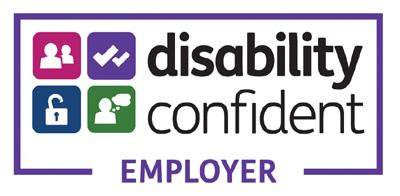
There are certain national standards and duties that we must follow as a public body, including the Welsh Language Standards and the Equality Act. For the first time, we’ll also be reporting this year on the commitments we’ve made as a corporate parent.
Here’s how we’ve delivered on these standards and duties this year.
Our aspiration is clear: we want the Welsh language to be a living, breathing language in our organisation. In practical terms this means:
• The team uses it every day, in every aspect of our work;
• It is not something we just use to convey messages but it is a way of us connecting with one another and those who we are here to represent;
• Among those in the Team who do not speak Welsh there is goodwill and a sense of ownership towards learning and using the language;
• There is recognition by all of its contribution to the culture, society and economy of Wales;
• We achieve, and in some cases surpass, our statutory obligations under the standards outlined in the Welsh Language Measure (Wales) 2011;
• There is ownership of our aspirations to comply, promote and protect the Welsh language at Management Team level; and
• We monitor our activities through Management Team meetings, hold joint responsibility and agree proactive steps to support and increase the use of the language in our workplace
We actively promote the language and the principles of the Welsh Language (Wales) Measure 2011 and have measures to ensure we comply with these Standards.
As at 31 March 2025, there were 23 people working for the Commissioner. Of those staff members :
8
describe themselves as unable to speak Welsh/entry level Welsh
3 2 8
described themselves as having intermediate level skills in Welsh
describe themselves as having advanced skills in Welsh
described themselves as proficient in Welsh
We received no complaints in relation to the Welsh language during 2024/25.
The Commissioner is a listed authority under the Equality Act (Statutory Duties) (Wales) Regulations 2011. This means that the office must follow what are called ‘general duties’ to promote equality.
As a national human rights institution, equality is at the heart of the Commissioner’s vision and mission. This year saw us continue to refine our strategic equality delivery plan to ensure alignment with our equality objectives and our wider strategic priorities. You can read our updated strategic equality objectives and delivery plan on our website here: childcomwales.org.uk/about-us/ our-work-on-equality/

In our published commitments to care experienced young people, we promised to report on our work and progress in all areas of the Welsh Government’s Corporate Parenting Charter, which we have been proud to sign up to and implement a full action plan to embed in our work.
Here are the highlights from our work in this space this year:
• We’ve refined our approach to our Advisory Panels, who form part of our strategic governance and work planning. This has included successfully recruiting a number of groups of care experienced young people to feed in to conversations on our work and priorities. Work will continue on this in the coming year.
• Through our casework, we’ve particularly championed young care experienced people facing homelessness at the transition point when they turn 18. This was a feature of individual cases where we’ve successfully obtained suitable accommodation for those individuals, but really they shouldn’t have had to come to us to be listened to and supported in this way. This has also influenced our policy work through the Lwc exhibition we hosted in November 2024, through our engagement with Senedd Members and Ministers, and through our membership of Government working groups on Corporate Parenting and the Transformation of Children’s Social Care. We will continue to take these calls forward through revisions to the Code of Practice for Part 6 of the Social Services and Wellbeing Act.
• We have signed a new Memorandum of Understanding with the Senedd, through the Llywydd and Senedd Ieuenctid, to ensure greater scrutiny of our work through the Youth Parliament as well as greater collaboration and joint working on issues of importance to young people, including those with care experience.
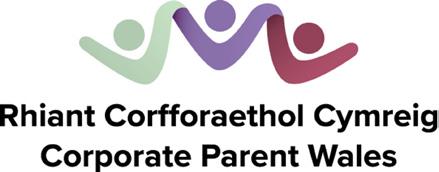
• We’ve focused on producing more accessible content and resources across a range of online platforms, and updated our website, to ensure greater reach and engagement with our work. We’ve invested in training across the staff team to support this.
• We’ve regularly attended a number of different care experience support groups or fora to hear directly from young people about their experiences and priorities. Staff from a range of teams within our organisation have taken part in these visits to ensure direct impact in all areas of our work.
• We’ve been working to revise our complaints procedures, through work on a model complaints process, with external partners. This is aimed at making complaints systems easier to access and navigate. Work is ongoing on this aim this year.
• We’ve engaged with several care experienced young people to explore work experience options, and we’ve successfully concluded one placement to date. We supported the young person to engage with this placement and are in the process of producing an evaluation of this to share with Welsh Government, with the aim of supporting more public bodies to proactively offer similar experiences. We will continue to target care experienced young people to facilitate work experience placements, as part of a broader approach to ensuring our work experience aims to combat disadvantage and discrimination.
Our workforce Equality, Diversity and Inclusion Profile for the financial year 1 April 2024 to 31 March 2025
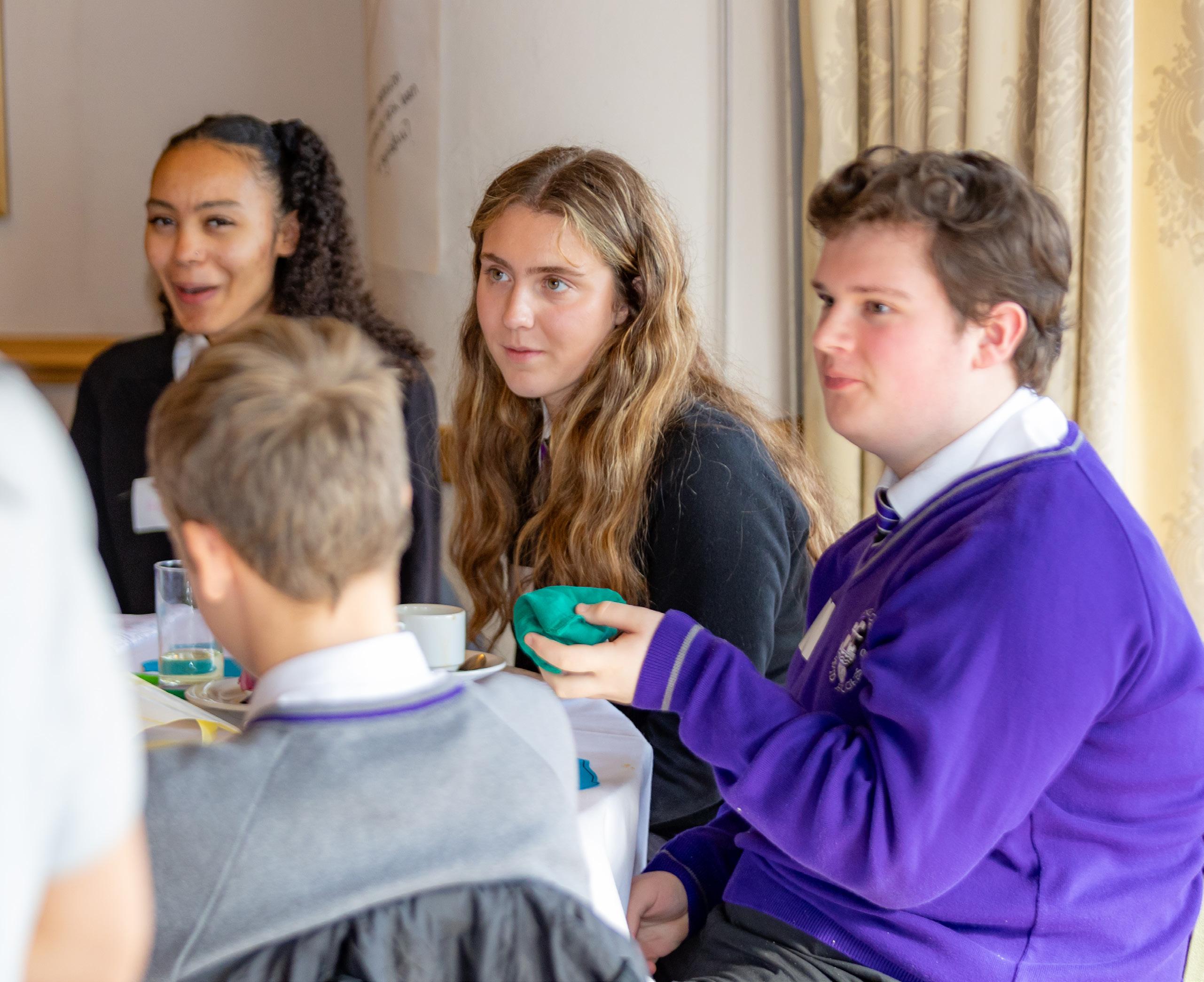
We gather information about diversity from our Team and the Commissioner’s Audit and Advisory Panel members in relation to all of the protected characteristics covered by the Equality Act each year. These important statistics help us to identify positive actions to improve the inclusive nature of our workplace. This is a voluntary request and approximately 15% of participants choose the ‘prefer not to disclose’ option for each equality characteristic so we do not have a complete picture and we caveat this section on that basis.
Whilst we recognise the importance of sharing our diversity statistics, we are a small team (just 23 people on 31 March 2025), so there are limitations on the level of detail we can share to respect the data protection rights of our colleagues.
For ease of reporting and comparing between years, we report our statistics on a fixed date in the year (31 March 2025). As a result, we must also accept that this method will not capture the diversity profile of all short-term employees or placement students we have supported in this time who will undoubtedly bring a wealth of perspectives and experiences to our Team.
Despite these limitations the data provides us with reasons to celebrate and an indication of what is helping us on our journey towards building a more inclusive workplace.
Despite the limitations in the data as indicated above, there are things to celebrate this year from an equality perspective about the make-up of our small Team:
• We are proud of our gender equality in terms of empowering women in the workplace. We have a female Children’s Commissioner and a management team that includes 5/6 female leaders. This year has seen a significant shift in our gender pay differentials (see section 4);
• We are proud of our Welsh language culture. We have a high percentage of colleagues from a Welsh ethnicity and 61% of our staff team have advanced and proficient skills in the language;
• We are also making strides to improve the diversity of our Team with some important (and previously missing) perspectives from minority ethnicities in Wales including the Chinese community and beliefs including Buddhism.
• We are proud of our efforts to support people with long-term health conditions in the workplace and have been learning from colleagues and Audit and Advisory team members who understand disability by association. Some of the support initiatives offered for our staff includes our flexible working approach, remote working abilities, leave to attend medical appointments, external services such as Access to work and Occupational Health, purchasing of specific office equipment and DSE assessments. We support young people with disabilities to participate in recruitment processes and our Advisory Panel meetings and activities, learning all the time from their relatives and the young people themselves about the best way to enable their full participation. We have also continued our journey this year to becoming a trauma informed organisation and we have continued learning from our membership of the Disability Confident Scheme.
• We employ people from across the age ranges with our youngest Team member being in their 20s and the oldest over 60 years of age.
• As a very small team of people, the diverse lived experiences of members of our Adult Advisory panel and Children and Young People Advisory Panel also make a vital contribution to the breadth of our world views.
We are cautiously optimistic that the changes to our recruitment processes will continue to increase the diversity of our Team; nevertheless, we are not complacent about our workforce equality. We know the diversity of our Team can change with just one resignation and there remains some important lived experiences absent in our current staff makeup.
However, our Advisory Panel members fulfil a vital role in bringing missing voices to our work. Our current panel includes people with LGBTQ+ lived experiences, disability and minority ethnic backgrounds and different religions. During the past year, we have not had any job recruitment opportunities through which to refine or test our recruitment processes in relation to equality.
Our learning and development activities this year included training on Fire Safety Awareness, First Aid training , and learning more about the inequality experienced by refugees and asylum-seeking children and families. To learn more about food poverty, our whole team undertook volunteering visits to food-banks via the Trussell Trust.
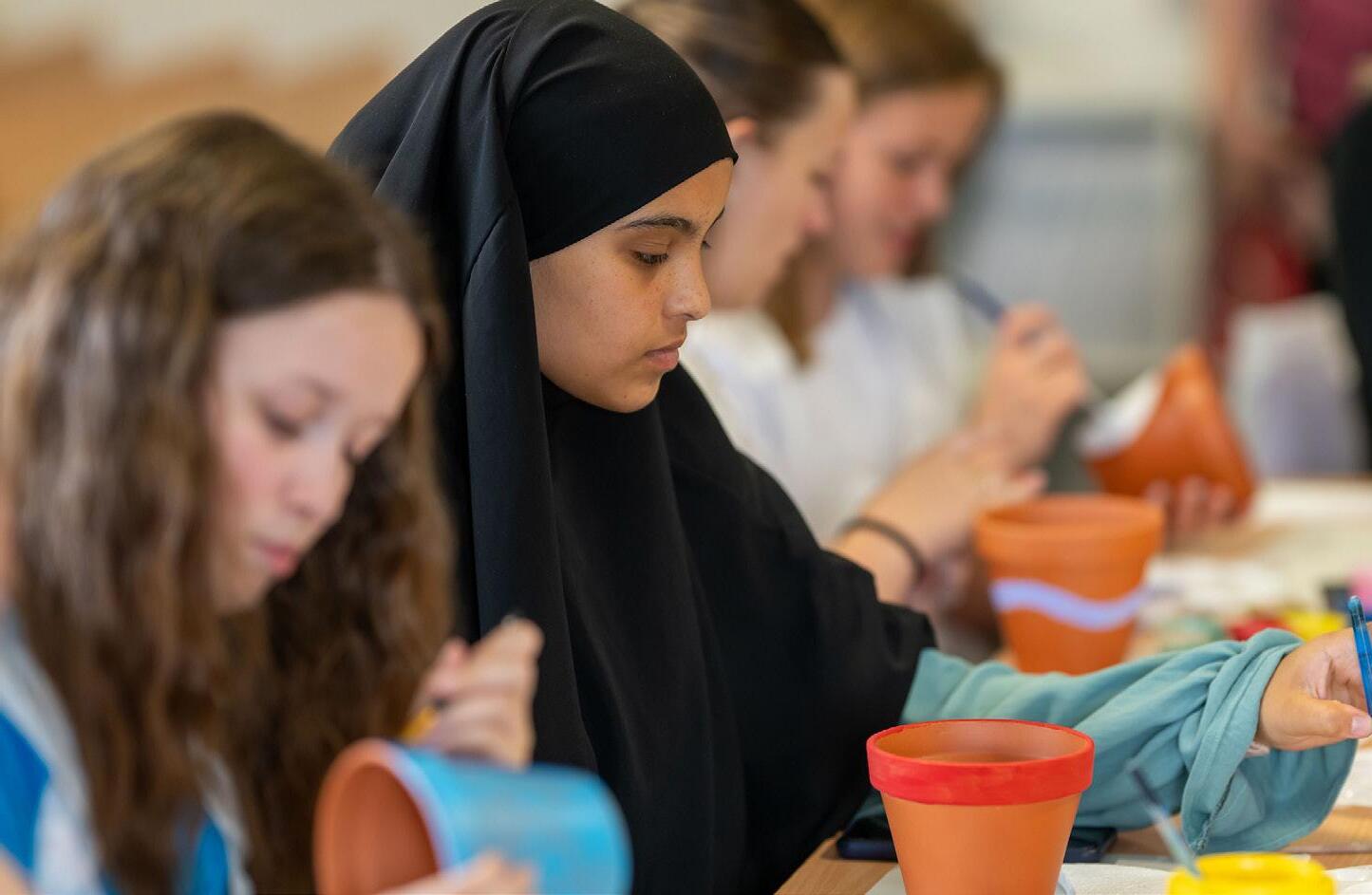
On the 31st of March 2025, we had twenty-three people on the payroll (including the Children’s Commissioner).
Between 1 April 2024 and 31 March 2025, one person who was on a fixed term contract left the Team.
In this period there were no new appointments.
On 31st March 2025:
• 4% of our workforce (1 person) was engaged on a fixed term basis directly related to maternity cover.
• 56.5% of colleagues (13 out of 23 people) worked full time hours and 43.5% worked part time hours. This was the same as the previous year. 8.5% of our part time workers are male (2 out of 10 people). There is unchanged from the previous year.
• 82% of our workforce identify as female; this is the same as last year. Similarly, the majority of our Audit and Advisory Panel members are female.
• The majority of the staff team disclosed a heterosexual orientation or preferred not to disclose their sexual orientation. A small percentage of our Audit and Advisory Panel members disclosed a gay orientation.
• No one in the Team disclosed transgender, bi gender or gender fluid identities in this period.
• 35% (8 people) of our colleagues in this period are under 35 years old; this is slightly less than last year where 39% of our workforce was under 35 years of age. 37.5% (2 out of 8 people) of this age group works part time.
• 43% (10 people) of our colleagues in this period are between 36 and 54 years of age. 30% (3 out of 10 people) of this age group works part time. The majority of our Adult Audit and Advisory Panel is in this age range.
• 22% (5 people) of our colleagues are aged 55 years and over, the same as last years’ figure.; 60% (3 out of 5 people) of this age group works part time.
• We do not currently employ anyone over age 65.
• 15% of our workforce live with a long-term health condition/disability; compared to 22.5% of the Welsh workforce as a whole.
• 87% of our workforce on 31st March 2025 declared they were from a white ethnicity (the same as the previous year); with 61% describing themselves as White Welsh. Other ethnicities in our current Team include Latin American and Chinese.
• 61% of employees (14 out of 23 people) describe their Welsh language skills as either proficient, advanced or intermediate level. 39% of our workforce declared they have entry-level or foundation skills in the language, the same as the previous year.
• 48% of our workforce declared their commitment to a specific religion (Christianity, Buddhism and one other included). 35% of colleagues declared they have no religion or belief, whilst 17% prefer not to disclose. Our Adult Advisory panel includes people from Sikh and Muslim religions.
• During this financial year, we have supported two people through pregnancy and maternity leave.
• Representatives from all genders, most grades and contract type accessed learning and development opportunities this year. In addition to individual learning applications, our whole team development programme continues and enables part-time workers, temporary workers and workers with protected characteristics to have equal access to learning and development opportunities.
The Job Evaluation and Grading System that underpins the pay system in CCfW allocates a banding to individual posts based on seven different work factors: autonomy, problem solving, decision-making, impact, management of resources, contacts and communication, knowledge and skills. This system ensures that differences in salaries for posts relate to specific job requirements and contributes to our commitment to eradicate bias in the recruitment process.
Of the 19 female staff in post on 31 March 2025, 5 employees, or 26% of the female workforce, were employed in the three highest pay bands; compared to 1 male employee, or rather 25% of the male workforce. The differential between the two remains 1 %, the same as the previous year.
The gender balance of the Management Team itself is now weighted heavily towards female members of staff with 5 female participants and 1 male participant.
Female staff continue to be the larger part of our workforce, and a female occupies the most senior position in the organization. The average full time equivalent salary for a female worker on 31 March 2025 has risen to approximately £45,500k from £43K last year and the average salary for a male worker has risen to approximately £47,426 from
£45k last year. The differential between the two genders has becoming virtually negligible this year, with female workers earning £174 per year more than male workers, compared to male workers earning an average of £2k more last year, and £6k more than female workers the year before.
Only female staff members occupy the two lowest pay bands in CCFW and 7 of the 9 part-time workers in CCFW are female.
Of the 19 female staff members employed on 31 March 2025, 42% (8 people) occupy part time roles. 25% of the male workforce works part time. This compares to 50% of the male workforce who worked part time last year.
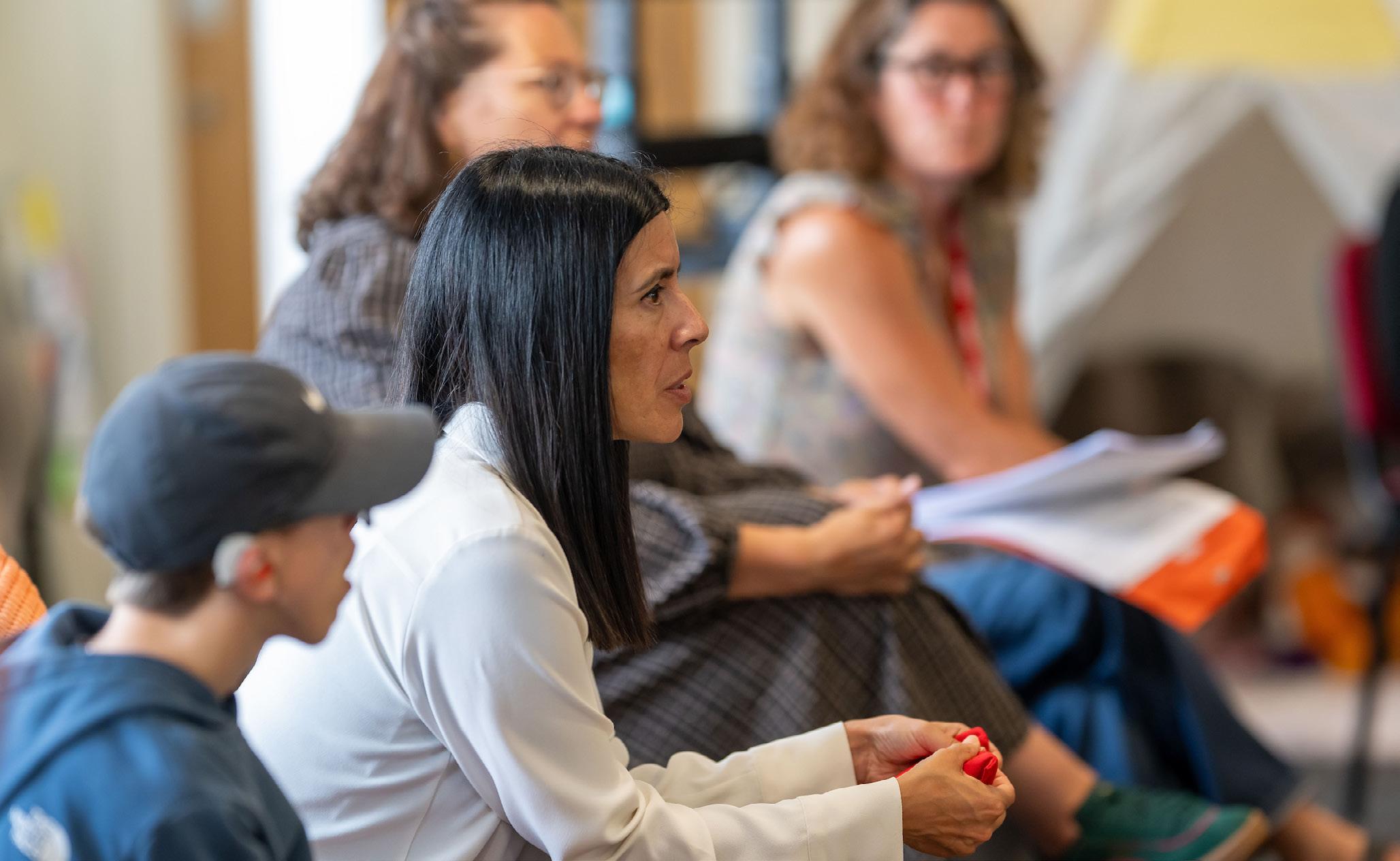
The following is a summary of the financial information contained in the Commissioner’s Annual Accounts for 2024-25. For a full set of financial statements these can be found on the Commissioner’s website –www.childcomwales.org.uk
The accounts were subject to external audit; the Auditor General for Wales provided an unqualified opinion on these accounts. Although independent of Government, the Commissioner’s only source of income is from the Welsh Government. We received £1.667 million (2023-24: £1.720 million) to fund our organisation and all its activities for 2024/25.
The chart below illustrates the costs of operating activities by category of expenditure. It also includes details of non-cash depreciation.
Our three-year strategy includes details of all our ambitions for children and young people. We develop annual operational plans to help deliver our ambitions and we make sure we retain capacity to respond to emerging issues every year.
As well as continuing to focus our efforts on our four priority areas of poverty, education and additional learning needs, mental health, and equalities, we plan on working on the following themes in our last year of delivering this current strategic plan:
Undertaking a listening exercise, reviewing the effectiveness of local participation strategies of local authorities across Wales
Working in partnership with the Public Services Ombudsman for Wales on a childfriendly complaints procedure for Wales
Work on developing our new three-year strategy
Sustain the roll-out of our ‘Right Way’ resources and support many more public bodies to implement a children’s rights approach
Reviewing our accommodation needs as an organisation
We’ll also be publishing our key calls for political parties standing in the 2026 Senedd elections
You can keep in touch with all our work via our monthly newsletters, quarterly impact reports and on our website, under ‘Our Work’.
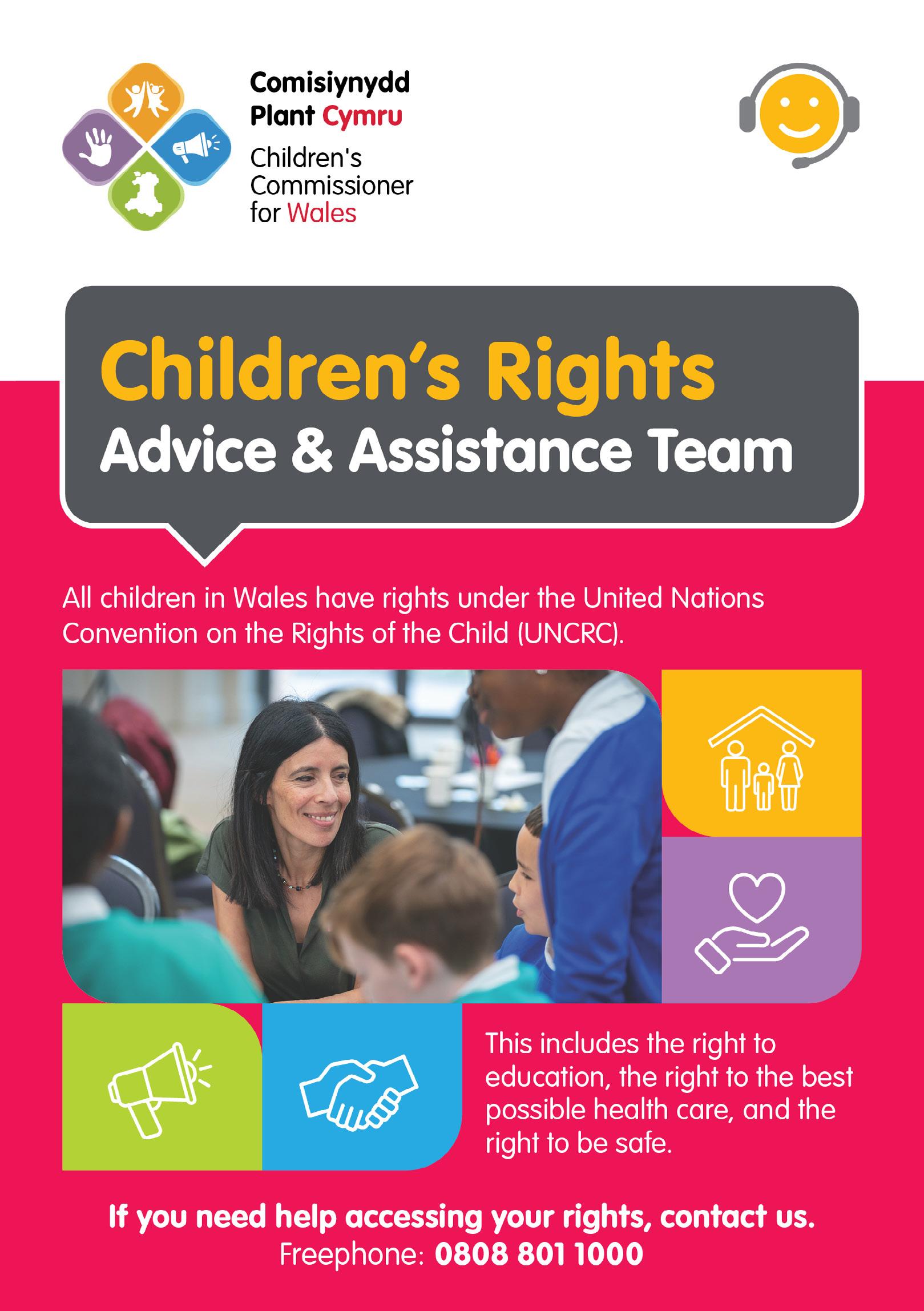
here to download a copy of the ‘Children’s Rights Advice and Assistance Team’ leaflet .